


FROM THE PRESIDENT OF THE AFRICAN MARKETING CONFEDERATION







WOW, WOW, WOW … what an exceptional event the Annual AMC forum 2024 was!
From the lineup of top African and international speakers to the exciting networking experiences and the fabulous venue, all leading up to an exhilarating AMC Awards evening –a gala occasion to beat them all!
Thanks to everyone who participated and to the AMC team that made it happen. You’ve set the bar high for next year’s hosts.
Warm congratulations to all our AMC award winners; you really are blazing a trail for African marketers. (See pg 26 for more detail). Congratulations, as well, to our newest AMC Honorary Member – Gillian Rusike, CEO of the
MAZ. The award recognises Gillian’s longstanding service to the development of the AMC.
More countries are joining the AMC fold
During the forum we also welcomed three new AMC members. They are the Marketing Association of Botswana, the Angola Marketing Network, and the Mozambique Marketing Association. The forum aside, we have been hard at work ‘internationalising’ the AMC and putting Africa on the global marketing stage.
We’re proud to announce that the AMC and its member associations have been elected to sit on the ISO Technical Committee for the global ISO Digital Marketing project. Other organisations involved include the Advertising Media Forum (AMF) and European Marketing Confederation (EMC). We look forward to working with our global colleagues on this exciting project.
Last but not least, we’ve launched the AMC Certified Professional Marketer designation in collaboration with the Marketing Institute of Singapore.
Enjoy this issue!
Helen McIntee
BA MBA (Wits) CM (SA) Co-founder and President: African Marketing Confederation
MESSAGE DU PRÉSIDENT DE LA CONFÉDÉRATION AFRICAINE DU MARKETING

WOW, WOW, WOW
... LA
FORUM ANNUELLE
2024 du CMA a été exceptionnelle !
Avec des intervenants africains et internationaux de haut niveau, des expériences de mise en réseau enrichissantes et un lieu magnifique, autant d’éléments ont contribué à une soirée de remise des prix de l’AMC incroyable, une soirée de gala unique !
Merci à tous ceux qui ont participé à l’événement et à l’équipe de l’AMC qui l’a rendu possible. Vous avez placé la barre très haut pour les hôtes de l’année prochaine.
Félicitations chaleureuses à tous les lauréats du prix de l’AMC ; vous ouvrez vraiment la voie aux spécialistes africains du marketing. (Voir p. 26 pour plus d’informations). Félicitations également à notre nouveau membre honoraire du CMA, Gillian Rusike, PDG du MAZ. Ce prix honore les contributions de Gillian à l’évolution de l’AMC depuis plusieurs années.
Au cours de la forum, nous avons également accueilli trois nouveaux membres de l’AMC. Il s’agit de l’association de marketing du Botswana, du réseau de marketing de l’Angola et de l’association de marketing du Mozambique.
La forum mise à part, nous avons travaillé d’arrache-pied pour «internationaliser» l’AMC et placer l’Afrique sur l’échiquier mondial du marketing.
Nous sommes fiers d’annoncer que l’AMC et ses associations membres ont été élues pour siéger au Comité technique de l’ISO pour le projet global ISO Digital Marketing. Parmi les autres organisations impliquées figurent l’Advertising Media Forum (AMF) et l’European Marketing Confederation (EMC). Nous sommes impatients de travailler avec nos collègues du monde entier sur ce projet passionnant.
Enfin, nous avons lancé le label AMC Certified Professional Marketer en collaboration avec le Marketing Institute of Singapore.
Bonne lecture !
Helen McIntee
BA MBA (Wits) CM (SA) Cofondateur et président
: Confédération africaine du marketing
UOs conjuntos de fórum de 2024 elevam a fasquia para 2025
AU, UAU, UAU... QUE EVENTO extraordinário foi a fórum Anual AMC de 2024!
Desde o alinhamento de palestrantes africanos e internacionais de topo às estimulantes experiências de networking e ao fabuloso auditório, tudo isto culminou numa emocionante noite de entrega dos Prémios AMC - uma gala dificil de superar!!
Obrigado a todos os que participaram e à equipa da AMC que tornou tudo possível. Colocaram, certamente, a fasquia mais alta para os anfitriões do próximo ano.
Calorosas felicitações a todos os vencedores do prémio AMC; estão realmente a abrir caminho para os profissionais de marketing africanos. (Ver pág. 26 para mais pormenores). Parabéns, também, ao nosso mais recente Membro Honorário da AMC - Gillian Rusike, Diretor Executivo do MAZ. O prémio é um reconhecimento do serviço de longa data prestado por Gillian em prol do crescimento da AMC.
Durante a fórum, também demos as boas-vindas a três novos membros da AMC. São eles a Associação de Marketing do Botsuana, a Rede de Marketing de Angola e a Associação de Marketing de Moçambique.
A forum à parte, temos estado a trabalhar arduamente para “internacionalizar” a AMC e colocar África no palco do marketing global.
É com orgulho que anunciamos que a AMC e as suas associações filiadas foram eleitas para integrar o Comité Técnico da ISO para o projeto global de Marketing Digital da ISO. Outras organizações envolvidas incluem o Advertising Media Forum (AMF) e a European Marketing Confederation EMC). Aguardamos ansiosamente a oportunidade de trabalhar com os nossos colegas de todo o mundo neste projeto empolgante.
Por último, mas não menos importante, lançámos a designação de AMC Certified Professional Marketer em colaboração com o Marketing Institute of Singapore.
Desfrute desta edição!
Helen McIntee
BA MBA (Wits) CM (SA) Cofundadora e Presidente: Confederação Africana de Marketing
PUBLISHER
African Marketing Confederation
https://africanmarketingconfederation.org info@africanmarketingconfederation.org
PUBLISHING COMMITTEE
Kwabena Agyekum (Chair)
Helen McIntee
Nigel Tattersall
Mike Simpson
A.M.C. PRESIDENT
Helen McIntee
A.M.C. SECRETARY GENERAL
David Balikuddembe
EDITORIAL
Simpson Media
Editor: Mike Simpson mike@media-simpson.com
ADVERTISING SALES & COORDINATION
Avenue Advertising
Managing Director: Barbara Spence
Landline: +27 11 463 7940
Mobile: +27 82 881 3454 barbara@avenue.co.za
DESIGN & LAYOUT
Tamlin Lockhart Design tamlin@tamlinlockhart.co.za
PRODUCTION
Reproduction: Tamlin Lockhart Design Digital magazine: Belgium Campus Print magazine: Business Print
IN ASSOCIATION WITH Angola Marketing Network
Chartered Institute of Marketing, Ghana
Ethiopian Marketing Professionals’ Association Institute of Marketing in Malawi
Institute of Marketing & Management, Mauritius Institute of Marketing Management, South Africa
L’Association Marocaine de Marketing et de la Communication
L’association Tunisienne des Professionnels de Marketing et de la Communication
Marketing Association of Botswana
Marketers Association of Zimbabwe
Marketing Society of Kenya
Mozambique Marketing Association
National Institute of Marketing of Nigeria
Tanzania Marketing Science Association
Uganda Marketers Society
Zambia Institute of Marketing
issue of Strategic Marketing for Africa, the thought-leadership magazine for well-informed marketing professionals on the continent.
As I write this, I’ve not long returned from the AMC Marketing Forum held in Mombasa, Kenya as part of the confederation’s commitment to rotate the event annually to different parts of the continent.
I’m still on a high! It was a simply awesome occasion, held at a wonderful location and attended by amazing, friendly, well-informed people!
I am fortunate enough to have been involved with the African Marketing Confederation since its very early days when Nigel Tattersall, Gillian Rusike and Helen McIntee conceived the idea of a pan-African umbrella body for marketers. The first steps were stuttering, but the vision was bold and the determination unswerving.
On the first morning of this year’s Mombasa gathering I looked around the full conference room and thought how far it has all come. The speaking roster was filled with interesting topics and there were delegates and speakers from many parts of Africa and much further afield – Germany, Malaysia, Indonesia, Singapore, New Zealand. Even the legendary marketing guru Philip Kotler made an appearance via live link.
The AMC has taken African marketing to the world, and brought the marketing world to Africa!
Of course, as an editor and journalist I’m always on the lookout for good content. So, I flew out of Mombasa a happy man, knowing some great marketing minds had given me excellent thought-leadership content
with which to populate this magazine and the news section of the AMC website.
You’ll find extensive coverage of the Mombasa forum in this issue – in fact, we even held back the publication date to accommodate articles and photographs from the event. But there’s simply too much to cover in one magazine, so look out for more in-depth articles from the forum in the next issue of the magazine as well.
We appreciate you joining us for this latest issue of Strategic Marketing for Africa, courtesy of the African Marketing Confederation. And if you happen to be one of the folk who were in Mombasa – thanks for being amazing!
Mike Simpson Editor
A reminder that this is your African Marketing Confederation magazine. We are always keen to showcase what our AMC member countries are doing to advance the profession, so please keep the information coming.
As our aim is to include the best marketing insights from across Africa, we also welcome content ideas, article pitches and press releases from the wider marketing community.
Please note that the AMC supports ethical journalism, and all content is published solely at our discretion. We do not trade editorial content in exchange for paid advertising.
This publication is not your only source of marketing news. Our AMC website is updated daily with interesting marketing snippets and content. You can find us here: https://africanmarketing confederation.org/news-articles/
8 THE METAVERSE
Once touted as the next big thing, Africa’s Metaverse mania appears to have died down. Or is it quietly evolving?
14 MARKETING FORUM
Marvellous moments in Mombasa as Kenya hosts the annual African Marketing Confederation gathering
30 THIRD-PARTY DATA
Is Google’s decision to stick with third-party cookies a response to pressure from marketers, or about data addiction?

Social media hype and exciting visual presentation are driving the rapid expansion of an Egyptian desserts business
NIMN President warns against marketing buzzwords which are being twisted to create sensation and fragmentation
AREAS
How successfully navigating AfCFTA could create many African export opportunities for Malawian businesses
Third edition of the Silverback awards are unveiled in Kampala by Uganda’s advertising and marketing bodies
40 CASE STUDIES
Understanding the case study formats and knowing how to write one has become crucial for African marketers 44 MEMBER NEWS:
Marketers Association of Zimbabwe (MAZ) hosts the fun-filled Inaugural Interbrands Sports Games in Harare

driving the recovery of the post-pandemic South African inbound travel market
50 BUSINESS CARDS
The humble business card is an old, but still relevant, standby in a modern world of tech-driven communication
53 SHAREHOLDER VALUE
How the marketing industry can support the growth and development of the new Ethiopian Capital Market
56 MEDIA CONSUMPTION
Are Africa’s Gen Zedders done with traditional TV? ‘Yes’ and ‘no’ because there are significant regional variations
58 E-COMMERCE
Nigeria’s OmniRetail B2B e-commerce platform targets countries in Francophone subSaharan Africa
6 INTRODUCING THE A.M.C.
The marketing strategies
The African Marketing Confederation is spearheading the development of the highest standards of marketing

To develop Marketers into positions of influence.
Promoting professional development of Marketers in Malawi.
Setting best marketing practice standards. Offering professional marketing training courses.
Networking opportunities for Marketers. Organising marketing events. Providing guidance to marketing students.
We have individual and corporate membership categories.
Membership runs from 1st April 2023 to 31st March 2024.
To become a member contact Vidah Mmadi on +265 991 00 83 88.



Confederation is the groundbreaking pan-African body of marketing professionals spearheading the ongoing development of the highest possible standards of marketing across Africa. Founded in 2011, the AMC is a collaboration between the various national marketing bodies and
L’ASSOCIATION
The AMMC (English name: Moroccan Association of Marketing and Communications) was created in 2013 as a platform for the country’s marketing and communication communities. Its aim is to promote the professions, develop the skills and knowledge of members, and promote the economy of Morocco.
Visit Facebook page

MARKETING ASSOCIATION OF BOTSWANA
More information coming soon!
associations to exchange expertise and information, as well as to promote the marketing profession as a whole. By unifying the bodies in the various countries, the AMC exchanges expertise and information, provides intellectual capital, and ensures that the continent has a platform for like-minded marketing professionals.
ANGOLA MARKETING NETWORK
More information coming soon!
Established in 2012, the aim of the ATPMC (English name: Tunisian Association of Marketing and Communications Professionals) is to offer the country’s marketing and communications professionals privileged access to a network of colleagues and high-level industry experts. It also promotes the image of marketing and communications in Tunisia. Visit website
NIMN was established by Act of the National Assembly no. 25 of 2003 with a chartered status conferred on it, the responsibility to regulate and standardise marketing professional practice through the conduct of professional examinations and certifications, training, retraining and consultancy services geared towards ensuring that members adopt a professional approach to marketing.
Visit Website

The Chartered Institute of Marketing, Ghana was founded in July 1981 with the vision to be the voice of marketing practice in Ghana. The Chartered Institute of Marketing, Ghana (CIMG) ultimately aims to see organisations (both private and public) embrace the marketing concept, and be marketingoriented in their operations.
Visit Website

The Institute of Marketing Management South Africa (IMM) has for decades been the pre-eminent marketing institute in Southern Africa, bringing together likeminded individuals and organisations to share thoughts and experiences within the rapidly changing marketing environment. The IMM South Africa offers a range of activities and services for marketing professionals.
Visit Website

Uganda Marketers Society is the premier organisation for marketers in the country, dedicated to promoting excellence in the field. UMS provides a range of resources and opportunities for skill-building, so members can stay up-to-date with the latest trends and best practices in marketing. We help members become the best marketer they can be.
Visit Website

MSK is the national umbrella body for all marketers in Kenya. Its key mandate is to empower and regulate the marketing industry by creating policy that governs the Marketing Industry (self-regulated), education and training of professionals, corporates and entrepreneurs, marketing and business mentorship, and arbitration through the Advertising Standards Board.
Visit Website

The Tanzania Marketing Science Association is a one-voice platform which harmonises the knowledge and practice of marketing in Tanzania. TMSA’s aim is to achieve a strong marketing professional ecosystem in Tanzania by driving collaboration between industry and marketing experts. Its services include professional training programmes, ranging from certified to professional marketer.
Visit website

The Marketers Association of Zimbabwe was launched in 2007 with a vision to be a leading body of marketing professionals promoting professionalism of the highest standards, and establishing channels of career development for the benefit of organisations and the Zimbabwean economy at large. Visit Website

The Ethiopian Marketing Professionals’ Association is a beacon of marketing excellence, officially recognised and licensed by the Ministry of Justice under Proclamation No. 621/2009. The EMPA’s goal is ambitious but tangible: To emerge as Africa’s leading marketing association and catalyse engagement, education, inspiration, and the training of exceptional marketing professionals.
Visit Website

The Zambia Institute of Marketing is a professional marketing institution that was established by an Act of Parliament No. 2 of 2022 to regulate, promote, uphold and improve the standards of training, practice and professional competence of persons and organisations engaged in marketing and advertising in Zambia.
Visit Website

The Mozambique Marketing Association (MMA) was established in 2024 and is dedicated to the development and promotion of marketing practices in Mozambique. MMA’s mission is to promote excellence in marketing and contribute to the development of the sector, providing assistance, training and resources to professionals, and serving as a platform for networking and knowledge exchange.

Established in 1991, the Institute of Marketing & Management is the leading professional marketing education and training institution of Mauritius.
No Website

IMM Malawi is a locally recognised and registered marketing body, whose agenda is to promote, enhance, and regulate the marketing profession in Malawi, with the aim of developing marketers into positions of influence. IMM Malawi started in January 2021, transitioning from the Chartered Institute of Marketing (CIM) Malawi.
Visit Website

Touted as the next big thing, Africa’s Metaverse mania appears to have died down. Is it yesterday’s news, or quietly evolving? Fiona Zerbst investigates.

and Facebook founder, Mark Zuckerberg, is still a Metaverse evangelist. Even though Meta’s Reality Labs business, which develops Metaverse hardware and software, has lost a whopping US$45-billion since 2020, Zuckerberg isn’t giving up on the future of augmented reality (AR), virtual reality (VR) and mixed reality (MR).
For the uninitiated, AR is an experience that combines the real world and computer-generated 3D content. VR is a fully immersive digital environment. MR is a view of the physical world with an overlay of digital elements where physical and digital elements can interact.
Clear? Or clear as mud? It’s one of the challenges that marketing executives have faced since around 2021, in trying to decide whether the much-hyped Metaverse could make the transition from tech-toy to contributing to marketing goals and, ultimately, enhancing the bottom line.
Zuckerberg is in the latter camp. In October 2023 he launched a cheaper, lighter Quest 3 VR headset with mixed-reality capabilities, and plans to release the Quest 4 in 2026. Not to be outdone, Apple launched its Vision Pro mixed-reality headset in February 2024 – and it has arguably superior multitasking capabilities to the Quest 3.
So Apple, like Meta, is betting that the Metaverse still has a future. RIP the Metaverse? Apple and Meta aren’t putting on their funeral clothes just yet.
As technology improves, we’ll likely see more affordable, less clunky headsets and new ways of immersing ourselves in mixed-reality worlds. This is the future of the internet and, of course, the Metaverse, believes Dr Mark van Rijmenam, author of the book Step into the Metaverse
Although The Los Angeles Times newspaper says the new kid on the
block, generative AI, has “eaten the Metaverse’s lunch”, AI is the fuel that will power the Metaverse as it’s being built, says Van Rijmenam, which will help to realise more elaborate 3D digital worlds.
“We’re made for 3D (three dimensions), not for 2D (two dimensions) – and as such, we need a new way of interacting with computers, beyond our laptops and cellphones,” he says. “I don’t think the Apple iPhone will even exist in a decade from now – we’ll probably use glasses that allow us to switch between AR and VR.”
The aim is to create the ultimate immersive experience, and ‘spatial computing’ – the new buzzword – will take the Metaverse into its next phase of existence.
For Michael Balkind, founder of SodaWorld, the revolution is both already here and not yet taking place. SodaWorld is an African-created and
developed technology platform that enables artists to earn revenue from within the Metaverse. It is claimed to be one of a few international platforms to utilise the Metaverse in a way that benefits creatives.
Balkind believes brands are aware that their customers live in unlikely places now. “My kids’ generation isn’t hanging out at the cinema or the bowling alley – they’re playing Roblox and Fortnite,” he says.
Roblox is an online game platform and game-creation system that allows users to programme and play games created by themselves or other users. Fortnite is an online video game and game platform that’s available in six distinct game-mode versions.
Around 80-million people log into Roblox every day (about 380-million a month, according to RTrack, a Roblox analytics service), making it the biggest gaming phenomenon in the world.
But it’s not just a gaming platform, says Balkind – it represents a seismic culture shift. “The Metaverse economy across four gaming titles is around $25-billion, an amount that’s already far exceeded the value of the entire music industry in Africa.”
Balkind’s business venture provides a glimpse into the future. SodaWorld is a broadast hub that allows anyone in the world to fully immerse themselves in the world of African performance. The company recently hosted the Road to Amapiano Festival Experience, giving visitors a taste of MR. “It represents the ability to engage with each other without the constraints of geography,” notes Balkind, who says the Metaverse thrives on “presence, intimacy and engagement”. It’s something he calls the “PIE model”.
Perhaps the most exciting point is that this technology is in its infancy. Although software development is typically rapid, we need a “hardware revolution”, says Van Rijmenam. “Once this happens, perhaps in a few years’ time, it will restructure our entire society,” he predicts.
Marketers are already using the Metaverse to create more immersive, engaging experiences for customers – but have they fully grasped its potential? Many are dabbling to get a sense of what works and what doesn’t.
US-based supermarket group Walmart, for example, has just launched Walmart Realm, a webaccessible e-commerce platform that allows customers to browse ethereal worlds. The gamified platform encourages users to collect Walmart ‘sparks’ and play a series of games to earn discounts on products.
Meeting customers where they are
However, Walmart also shut down Universe of Play, its branded space in Roblox, after just six months and was accused of stealth marketing to children. Getting the balance right is clearly tricky. Juston Breton, Walmart’s Director of Brand Experiences, admitted the company isn’t “investing in the Metaverse” as much as “meeting customers where they are online”.
While some remain bullish about the Metaverse as a marketing tool, others have left the fold.
Hussein Hashish, whom we interviewed for Strategic Marketing for Africa in 2022 when he was Chief Metaverse Officer at Athens DAO, a community of crypto investors, has since founded Likwid, a blockchainpowered platform that helps businesses launch customised, branded loyalty programmes.
Cairo-based Hashish says he has not used his MR headset for a year. “I’m one of many people who haven’t bought into the idea of having a headset strapped to their head for hours at a time to consume content,” he points
out. “Also, the Metaverse was supposed to hold the key to the future of remote work, but that hasn’t really happened.”
Hashish says the latest trend is to embed anything to do with AI in existing products and applications, which makes life so much easier for non-tech people, allowing them to build apps without having to hire developers or subject-matter experts.
“Being able to launch your own meme coin without coding, simply by posting a tweet on X (formerly Twitter), is a gamechanger,” he explains.
For African marketers, it’s important to understand that the Metaverse landscape is evolving slowly, emphasises Hashish.
“I’m keeping an eye on Metaverse trends, but I’m currently more focused on using AI tools to help me scale my business,” he says. “I think it’s too soon to capitalise on the Metaverse, which is still going to evolve. In the meantime, I’m going to watch where young customers are going.”
In Africa, this may mean finding them on their mobile phones, rather than expensive imported headsets. Meta is hoping to offer access to the Metaverse through smartphone apps, and its 2Africa submarine internet cable could help to reduce costs and improve connectivity on the continent, although this will take time.
But unless you’re well off, you’re unlikely to be able to afford the data required to access the internet, never mind buy a pricey headset, says Balkind.
“The price of data keeps the internet out of [Africa’s] townships and rural areas, meaning these kids are being left behind,” he says. Making mixed reality more widely accessible to less affluent children is one of his current missions.
There are pockets of Metaverse experimentation in Africa: South African’s first Metaverse realm Ubuntuland, where you buy, sell

and trade with $UbuntuTokens; the #Flexnaija event in Nigeria (a mixed reality event showcasing fashion, music, art and comedy in Lagos); and Liquid Space in Kenya, a virtual collaboration platform which runs across VR, Windows and mobile devices.
South African fashion brand Maxhosa has launched a virtual showroom that showcases it latest collections, and car dealerships in Nigeria and Kenya are using 3D scanning and digital twin technologies to capture and display showroom vehicles.
In the property arena, real estate companies are using Matterport to offer highly immersive virtual property tours. Matterport virtual tours are marketing
tools that help estate agents win listings and sell properties.
CTM, a specialist tile and bathroom retailer that operates around 90 stores in Southern and East Africa, uses Roomvo to provide 3D visualisations of home décor and furnishings. So does South African tile retail chain, Lifestyle Ceramics.
“The technology allows customers to see how products like tiles and furniture will look in their own space, offering a virtual try-before-you-buy experience,” says Metaverse-focused entrepreneur, Abel Kounda, who adds that his business helps companies use existing technology to create such immersive, personalised shopping experiences.
EDITOR’S NOTE:
When we planned the editorial content for this issue, we pencilled in the Metaverse article, as well as one on ‘Artificial Intelligence and Marketing’.
However, given the depth of this article, we thought readers may suffer from technology overload, and we therefore decided to hold over the AI article to our next issue. Thanks to everyone who agreed to be interviewed or contributed to the AI article – your voices will still be heard.
“By adopting these innovative approaches, brands are not only adapting to the digital age but also setting new standards in the way products and services are marketed and experienced,” he points out.
Kounda’s company, Metawave, has set up software comparison platforms where marketers can compare technologies, explore features and pricing, and consider which technologies would work best for them.
Kounda has a checklist for marketers who want to succeed in the Metaverse.
● Be mindful of varying levels of internet connectivity – ensure virtual experiences are accessible and engaging for users with different internet speeds and data limitations.
● Tailor your strategies to reflect local cultural and consumer preferences, taking regional languages and customs into account.
● Considering collaborating with influencers and creators to amplify your brand’s reach and create more authentic connections with your audience.
● Experiment with innovative use cases to stand out from competitors, but make sure you provide genuine value to users – which could include interactive content, exclusive virtual items, and unique immersive experiences.
● Set specific goals and KPIs for your campaigns, tracking user interactions, conversation rates and more to evaluate your campaign’s performance.
“View your investment in the Metaverse as a long-term strategy,” he says. “You should focus on establishing a strong presence and building lasting relationships with your audience.”


Balkind’s advice is to build communities authentically, much like African ‘culture zines’ (a self-published magazine serving a group with a specific interest), which know where and how to find their readers.
If we think about the Metaverse as just another potential platform on which to target young consumers, we’re not going to grasp the magic of the Metaverse at all. But understanding it as an environment in which we can become “more fully human” might
provide a clue as to what the future holds, he believes.
*Additional contribution by Mike Simpson
Fiona Zerbst has been a journalist and editor for over 20 years. She writes primarily about business and finance and has worked for publications and clients in South Africa, Botswana, Zambia, Nigeria, Canada, Finland and the UK.
DEAD OR NOT? EXPERTS GIVE THEIR VIEWS
The metaverse’s long-term success still hinges on its ability to overcome technical hurdles and user adoption.
Olayimika Oyebanji
Blockchain journalist & consultant July 2024
This is not the first time a tech hype cycle has resulted in spending on technologies that don’t pan out in the end; virtual reality, the Metaverse, and blockchain are prime examples of technologies that saw substantial spend but have few – if any – real-world applications today.
Jim Covello
Head of Global Equity Research at Goldman Sachs July 2024
While Gen AI may have, at least temporarily, pushed the Metaverse off the world stage, the two will inevitably enhance one another going forward.
Marty Resnick
Gartner analyst December 2023
Instead of virtual land and virtual shopfronts, start thinking of the Metaverse like the offspring of twin technological advancements –the internet and gaming.
Phil Rowley
Head of Futures at Omnicom Media Group UK July 2023
The Metaverse, the once-buzzy technology that promised to allow users to hang out awkwardly in a disorientating video-game-like world, has died after being abandoned by the business world. It was three years old.
Ed Zitron
CEO of technology PR firm, EZP May 2023
› Mwewa Besa, President of the Zambia Institute of Marketing, addressed the marketing forum on the topic ‘Financial Implications of Crossing Borders’. He also briefed delegates on the United Nations Tourism Project for Africa. The UN is concerned at the negative narrative about the continent, and the AMC is seeking the involvement of marketers to help shift this narrative


High-level delegates from across Africa and around the world gather in Kenya to discuss ‘Brand Resilience Amidst Economic Uncertainty’.

› Hermawan Kartajaya, founder of the Asia Marketing Federation and cofounder of the World Marketing Forum, addresses delegates
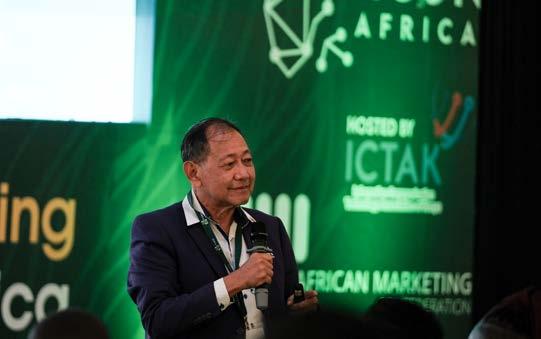
› Dr Syed Ferhat Anwar, President of the Asia Marketing Federation

AMC Marketing Forum took place at the beautiful Sarova Whitesands Beach Resort and Spa in the Kenyan coastal city of Mombasa in late September.
It brought together marketing professionals from across Africa –including Kenya, Ethiopia, Uganda, Tanzania, South Africa, Ghana, Nigeria, Angola, Mozambique and Botswana. They were joined by global colleagues from the likes of Singapore, Malaysia, Indonesia, United Kingdom and New Zealand.
Even Philip Kotler, marketing educator and author widely known as the ‘Father of Modern Marketing’, joined in and gave a live welcome address to delegates and speakers from his home in Chicago.
The three-day forum united the marketing fraternity under the theme ‘Brand Resilience Amidst Economic Uncertainty’. It offered detailed explorations into various brand-resilience strategies aimed at providing delegates with the knowledge and confidence to successfully spearhead their marketing efforts across the continent.
As in 2023, this year’s forum was hosted concurrently with the TICON Africa information technology (IT)
conference. This is in recognition of the growing synergies between the two sectors in the age of big data, AI and related technologies.
Hermawan Kartajaya, a long-time collaborator with Kotler on many books and projects, delivered the keynote address on the opening day, discussing ‘Reimagining Operational Excellence –Inspirations from Asia’, which is based on an upcoming book he is co-authoring. He is also the founder of the Asia Marketing Federation and co-founder of the World Marketing Forum.
Kartajaya has made his name focusing on the marketing and business opportunities in Asia, but sees the potential of Africa as the next emerging market frontier. So much so, that he believes the next books he co-authors could be about the continent. He has also suggested that the African Marketing Confederation should be a project partner.
Picking up on a comment made during the conference by Dr Mohamad Hery Saripudin, Indonesia’s Ambassador to Kenya, that Africa is a “beautiful girl”, Kartajaya said he would go a step further and categorise the continent as a “sexy girl” in terms of its potential.
Giving advice to African marketers on their strategies, he stressed that you don’t need to be the best brand –providing you’re different. “Be different, just be different,” he emphasised.
Discussing his latest book collaboration, published in August 2024, Kartajaya outlined the CI-EL (Creativity, Innovation –Entrepreneurship, Leadership) vs PI-PM (Productivity, Improvement –Professionalism, Management) model that features in the book.
CI-EL embraces Marketing and Humanity, while PI-PM embraces Technology and Finance. In the age of artificial intelligence (AI) marketers need to excel in CI-EL, while allowing PI-PM to be enhanced by AI.
Kartajaya stressed that human marketers could use AI to be better, but “humans must make decisions –AI only helps”.
In his presentation Dr Syed Ferhat Anwar, President of the Asia Marketing Federation, suggested that Asia and Africa could begin holding joint marketing conferences in the future.
The African Marketing Confederation and Asia Marketing Federation recently signed a memorandum of understanding to foster collaboration, growth and knowledge sharing between the two organisations.
Addressing forum delegates, Dr Anwar warned that marketers should not isolate themselves from their peers in other countries and regions. The result would be a descent into mediocrity.
“Isolation retards innovation. Thus, dissemination of local unique [marketing] recipes ensures growthenhancing brand equity,” he said.

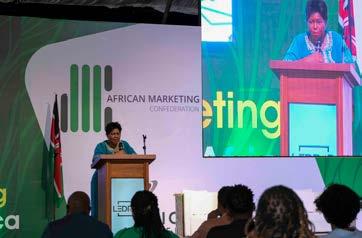
› Professor Emmanuel Chao, Chairman of the Tanzania Marketing Science Association and an associate professor at Mzumbe University in Tanzania, spoke on the topic ‘Evolving from Strategic Planning to Conscious Implementation’
› Dr Ruth B. Ncube, CEO of Terri Technologies in Zimbabwe and a well-known transformational leader, discussed ‘Strategic Talent Management for Marketers – Building High-Performance Teams’


“Compartmentalisation will create further disparity, while democratisation of global knowledge through partnership will ensure greater equity.”
Collaboration fosters innovation, which is one of the two most important things we need to consider in business, the other being marketing, Dr Anwar emphasised – quoting Peter Drucker, the famous management consultant, educator and author. Drucker’s reason for saying this is because both marketing and innovation bring in cash.
Addressing himself specifically to the marketing environments in Africa and Asia – he is Professor and Director of the Institute of Business Administration at the University of Dhaka in Bangladesh – Dr Anwar cited South Korea and Singapore as two Asian nations that have reached out to the world and embraced globalisation and collaboration. In doing so, they have become success stories.
Africa should start now in reaching out to the world to collaborate and, thereby, innovate. “Start now,” he said. “Africa is the future. Its human capital is strong. In Asia we waited for too long. Asia is the present market of the world; Africa is the future.”
Moky Makura, the Executive Director of Africa No Filter, pleaded for Africa to tell more of its own good stories and to tell them better.
“Africa is enjoying a ‘global moment’ with international attention focused on the continent’s art, fashion, music and the films being made about us. Right now, Africa is ‘cool’,” she said. And yet the stories being told about the continent, and the narratives about Africa in the media, remain largely negative.
Her NPO’s research showed five key frames around which most stories
about Africa are being told: ‘poverty’, ‘poor leadership’, ‘corruption’, ‘conflict’ and ‘disease’. In addition, there are three narratives through which the world is viewing Africa: ‘Africa is broken’, ‘Africa is dependent’ and ‘Africa lacks the agency to create the change that it needs’.
Nigerian-born Makura, who has been with Africa No Filter since its inception in 2020 as an organisation working to challenge and change harmful narratives about the continent, said it’s the third description that bothers her the most.
“The thing is that narrative matters,” she said. “Narrative matters because it informs our belief systems [and] it shapes how we think. But, more importantly, it shapes how we act,” she explained. “It affects how the world sees us as Africans, and it affects how we as Africans see ourselves.”
The role of African marketers and others working on brands is to help with promoting the good stories, Makura said.
“Companies and brands are all looking to be relevant and for people to engage with them. And the biggest trend – that has been hiding in plain sight – is Africa and Africa’s culture. It is viral, it’s everywhere, and young people are engaging with film, music and everything cultural.” Marketers should use this, she said.
Makura ended with a proverb: “Until lions learn to write, hunters will tell their stories for them.” She urged: “Let us be the lions that write.”
For CMOs and their advertising strategy teams and agencies, a common wisdom is to target consumers in the environments they’re spending time in. In the case of Gen Z, for example, this would likely focus heavily on social media and gaming.
But does your target audience want to see you there? In many instances, the answer is a resounding ‘no’.
In their presentation to the forum, titled ‘Media-Mix Mastery: ConsumerCentric Strategies’, Kantar executives
Daniel Oseman and Saiesh Ajudhiya outlined new research findings from South Africa which run contrary to conventional wisdom.
Oseman is Managing Director at Kantar East Africa and Chief Growth Officer West, East, and Central Africa. Ajudhiya is Head of Media and Creative (SA) for Kantar. As part of their presentation, the pair honed in on the recent Media Reactions 2024 study
conducted in the SA market.
The report combines insights from both consumer and marketer studies to provide a comprehensive view of the current media landscape. Although confined to SA at present, it may be extended to other African countries.
While TV and digital are very popular advertising channels and attracting a large percentage of adspend, the study says consumer feedback is showing that they prefer to be spoken to by advertisers on offline channels. Where they are happy to receive advertising on online platforms, they are most receptive on e-commerce sites, followed by influencer content.
› The Ghana delegation celebrates being awarded the 2025 AMC and TICON conferences. Kwabena Agyekum of CIMG holds aloft the ‘baton’. Immediately to the left are Nigel Tattersall, CEO of the AMC, and David Balikuddembe, Secretary General of the AMC

Ghana has been confirmed as the host of the 2025 African Marketing Confederation conference. This was announced at the conclusion of the Mombasa forum.
As in the previous two years, the 2025 TICON Africa information technology (IT) conference will be hosted concurrently with the marketing gathering.
The awarding of the event to Ghana marks the first time that the AMC’s conference will be held

in West Africa. The host is the Chartered Institute of Marketing, Ghana (CIMG), one of the founding members of the African Marketing Confederation.
Previous hosts of the conference are Zimbabwe, Uganda and, most recently, Kenya.
To jubilant celebrations, AMC President, Helen McIntee, officially handed over the baton to Ghana, noting that Kenya had “set the bar remarkably high” in 2024.
RUSIKE HONOURED FOR HIS CONTRIBUTION TO MARKETING
Gillian Rusike, one of the founders of the African Marketing Confederation and Executive Secretary of the Marketers Association of Zimbabwe, has been named as an Honorary Member of the AMC.
He was announced as only the third recipient of Honorary Membership during the 2024 AMC Marketing Forum. Other holders of Honorary Membership of the confederation are Matongo Matamwambi from Zambia and Godfrey Dube from Zimbabwe.
“Gillian is a remarkable man and a remarkable marketing professional. He has been with the AMC from the beginning,” said AMC President, Helen McIntee, in a tribute to Rusike.
“He is the visionary founder and
Interestingly, the preference for offline even holds true amongst Gen Z, who are the grouping most engaged in online behaviour. Gen Zedders prefer to be served ads at POS, sponsored events, OOH, digital OOH and via TV product placement.
chief executive of MAZ. A highly respected marketer and multi-awardwinning leader, he has significantly elevated the marketing profession in Zimbabwe. His burning desire to uplift marketing in the country led to the establishment of the Marketers Association of Zimbabwe in 2005.
“He later became the Secretary General of the AMC and has only recently resigned to go and study for his PhD in marketing.”
Rusike was unable to attend the 2024 Awards due to a prior commitment. But in a recorded acceptance speech played during the ceremony, he said he was honoured to accept the award.
He will be officially presented with his Honorary Membership at the 2025 AMC conference in Ghana.
Among Gen Y, the preferred platforms are OOH, sponsored events, digital OOH, cinema and TV sponsorship.
Gen X like to receive their ads at POS, sponsored events, radio, cinema and OOH. Baby Boomers only want to be
served ads on two platforms: via TV sponsorship and TV.
Another interesting finding from the study is that, increasingly, people are perceiving online channels as intrusive, repetitive, and excessively targeting them. Consequently, many offline platforms are more engaging to consumers, while a rising number of online platforms are not.
Offline platforms with growing levels of engagement are OOH, sponsored events, POS, digital OOH, cinema, TV sponsorship, and magazines.
Online platforms with declining levels of engagement are TV streaming, online video, video sharing, and online/ mobile games.
There is, therefore, a big gap between where marketers are focusing their budgets and where consumers are receptive to receiving advertising.
For marketing associations across Africa, financial viability and retaining members remains an ongoing challenge. It is a difficulty that’s not unknown in other parts of the world, either.
In New Zealand, for example, the NZ Marketing Association faced declining

› Marketers listen to one of the speakers

Financial viability is a challenge for marketing bodies ›
membership despite being well established and with a history going back 40-plus years.
That was in 2019. But it has turned around and today is a thriving organisation with a solid membership base of 9,000 marketers and projected 2024 revenue of US$2.5-million. This is despite there being no statutory requirement for membership.
John Miles, CEO of the NZ Marketing Association, outlined its turnaround strategy and plans to ensure its viability

The forum provided an opportunity to welcome new member countries into the AMC fold as a Primary Member. They received their Certificate of Membership during the Awards Evening and Official Closing Dinner.

The member bodies who received their certificates are the Angola Marketing Network, Ethiopian Marketing Professional Association, Marketing Association of Botswana, Mozambique Marketing Association, and the Tanzania Marketing Science Association.
Nyimpini Mabunda – well-known company president, CEO, board chair and best-selling author – gave the keynote address to the closing plenary session in Mombasa that brought together both marketing and IT delegates.
He told the gathering that winning organisations around the world have three key traits: They are tech by nature; They are exceptional at marketing; They combine the two well.
The future, he said, belongs to
technologists with marketing skills and marketers with technology skills. The Innovation Success Formula is: Marketers + Techsperts (technical experts) = Innovative Solutions.
When marketing and IT are combined, they produce super skills that Africa and the world needs, Mabunda emphasised. These are smart design, consumer and customer focus, innovation and creativity, solution orientation, scalable ideas, future focus (no legacy), and project management.

during a presentation titled ‘Helping your Marketing Association Grow and be Brilliant’.
Miles told delegates how, not long after his appointment in 2019, Covid lockdowns were imposed in the country, and the association’s two main revenue streams – live events, and live learning and development activities –immediately came to a halt. Worryingly, the organisation had no digital capability.
While the conventional wisdom was to cut costs, Miles and his team decided to rather innovate. They had a database of marketers sitting at home, so the decision was made to offer them “something to do” and be entertained.
The association reached out to Mark Ritson, an outspoken and well-known international brand consultant and marketing professor, to present a paid-for online marketing bootcamp that attracted 700 people. It was a decision that saved the organisation from bankruptcy.
It also attracted attention from the country’s marketing community and
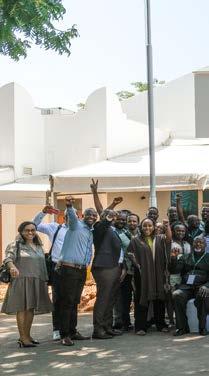
engendered renewed interest and trust in it as an innovative representative of the profession. “If you can find success, it will breed success,” Miles explained, adding that you “have to constantly add value”. But to do this, you need a way forward.
“With our board, we developed a clear strategy. Purpose: We enable marketers to be essential to creating value for New Zealand organisations. Aspiration: We deliver the best of local and global marketing nous and know-how to help build a nation of strong businesses and brands,” he told delegates.
The AMC Marketing Forum had a packed programme of informative speakers discussing high-level topics. It is impossible to cover everything in this issue of the magazine, so look out for additional forum reporting in our next issue as well. You can also visit the AMC website and social media pages for more forum coverage – The Editor.
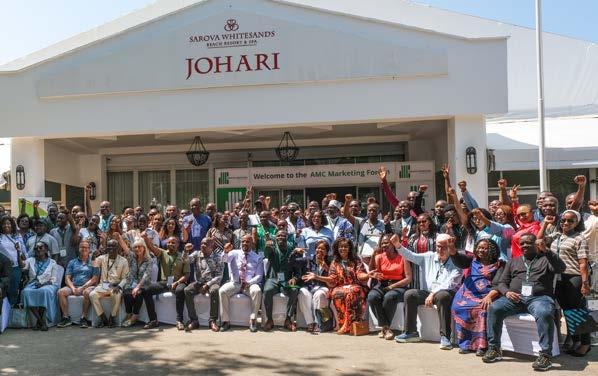



All work and no play … chases the joy of life away! The AMC Marketing Forum provided many excellent speakers and plenty of thoughtleadership moments. But each evening there was time to kick back, relax, network, renew old friendships and make new acquaintances.

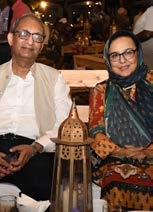

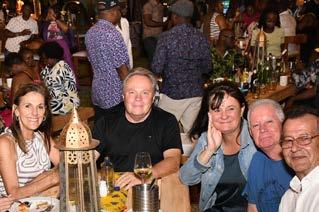

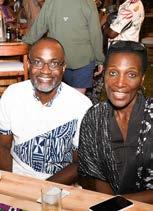



› The 2024 AMC Awards winners show off their trophies

and Uganda dominated the 2024 AMC Awards, held immediately following the conclusion of the three-day forum in Mombasa. The awards honour top marketing teams and brands for developing and executing innovative campaigns over the previous 12 months.
The Chairperson of the judging panel, Emuron Alemu, said the awards were “not just about a pat on the back and recognising ourselves, but are about inspiring and setting standards and benchmarks; showcasing the kind of work that inspires [us] to do better and set the benchmark for the year to come”.
The Brand of the Year category honours the brand that has demonstrated exceptional performance, innovation and leadership in the African marketing industry.
The Gold Award went to Stanbic Bank Uganda. The Silver Award went to Mi One of Uganda. Bronze was a three-way tie between Johnnie Walker Kenya, WhiteCap Kenya and Guinness Kenya.
This is awarded to the campaign that stands out as the most exceptional marketing effort of the year.
Gold was awarded to the Guinness Match Day campaign by Guinness Kenya. Silver went to the Chaka Chaya Ne Eco Cash campaign by Eco Cash Zimbabwe. Bronze was awarded to Billionz Zizino by Ithuba Uganda.
This recognises the campaign that achieved the most significant results in terms of business impact, driven by strategic use of technology, data and innovative approaches.
Gold was awarded to Stanbic National
Glittering awards ceremony concludes forum and recognises top marketing teams and brands for their innovation and excellence.
School Championship by Stanbic Bank Uganda. Silver was awarded to the Mi One Product Launch by TMI Technologies Uganda. Bronze went to OK Grand Challenge by OK Zimbabwe.
Recognises the most outstanding marketing campaign within the tourism and hospitality industry.
Silver was awarded to Destination Zambia by the Zambia Tourism Agency. There was no Gold or Bronze winner.
BEST USE OF LOCAL INSIGHTS
Celebrates campaigns that have successfully tapped into local culture, traditions and consumer behaviour to create highly resonant and effective marketing communications.
Gold went to Bart AI by Johnnie Walker Kenya. Silver went to Game of Change by Unicef Uganda. Bronze was awarded to Billionz Ziziano by Ithuba Uganda.
BEST SOCIAL MEDIA CAMPAIGN
This honours the most effective and creative use of social media platforms in a marketing campaign.
Gold was awarded to the Mi One Product Launch by TMI Technologies Uganda. Silver went to Billionz Ziziano by Ithuba Uganda. Bronze was a two-way tie between Gilbff from Gilbeys Gin Kenya and The Bar is Set from The Bar Kenya.
BEST CAUSE-RELATED CAMPAIGN
This category recognises the most impactful campaign that aligns a brand with a social cause or issue.
The Gold award went to Saving the Caps by WhiteCap Kenya. Silver was awarded to Stanbic National School Championship from Stanbic Bank Uganda. Bronze went to End Child Marriage by Unicef Uganda.


Social media hype and exciting visual presentation are driving the rapid growth of Egyptian desserts business, B.Laban. First Libyan outlet opens in Tripoli.
Egyptian-based desserts chain, has opened its first Libyan outlet in the capital city of Tripoli.
In Africa, the chain already operates in Morocco and its Egyptian home market. It also has a presence in multiple countries in the Middle East – Saudi Arabia, Jordan, Qatar, Oman, Kuwait and the UAE. The total number of outlets in the MENA region is now at around 120.
B.Laban is on a rapid expansion strategy after first opening its doors 2021. The explosive growth is being partly driven by a strong social media strategy targeting younger consumers. Hype, visual presentation and a willingness to show queues waiting to enter its restaurants are all part of the package.
“Its format of creamy desserts with a range of fruit, chocolate and pastry toppings has become a viral sensation across the Middle East. Highlights include
sweet koshary and ashtouta (traditional dishes popular in the region) and Biscoff toppings,” says Trendtype, the emerging markets consultancy.
“The brand is popular enough that it has already spawned copycats, such as the Qashtuta desserts chain in Oman.”
Commenting on the opening of the first B.Laban outlet in the Jordanian capital of Amman in January 2024, the publication Jordan News says “you can see the influence on the younger generation as [B.Laban] garners and plays to a younger audience”.
Calling the chain “a viral sensation”, Jordan News explains that when the Amman outlet opened, social media videos soon appeared, showing long lines of young people waiting in the street.
“What makes these desserts stand out is not just their taste but their

presentation – a feast for the eyes. The restaurant’s fame surged when social media showcased its beautifully presented dishes, which blend traditional Egyptian food traditions with online trends,” the publication reports.
“B Laban’s success on platforms like Instagram highlights a digital-age truth: the way to the heart is through the eyes as much as the stomach. In today’s world, where visual appeal is paramount, restaurants like B.Laban are leveraging this to their advantage, using social media to turn traditional culinary experiences into visual feasts that entice a broader audience.”
The chain’s move into the Libyan market highlights the wider interest of Egyptian businesses in doing business with Libya, which is showing good economic growth and enjoying relative political stability after a long period of turmoil and civil war.

L’engouement pour les médias sociaux et les présentations visuelles attrayantes sont à l’origine de la croissance rapide de l’entreprise égyptienne de desserts B.Laban. Ouverture du premier point de vente en Libye.
B.LABAN, L’AMBITIEUSE
chaîne de desserts basée en Égypte, a ouvert son premier point de vente libyen dans la capitale Tripoli.
En Afrique, la chaîne est déjà présente au Maroc et sur le marché égyptien. Elle est également présente dans plusieurs pays du Moyen-Orient : Arabie saoudite, Jordanie, Qatar, Oman, Koweït et Émirats arabes unis. Le nombre total de points de vente dans la région MENA s’élève aujourd’hui à environ 120.
B.Laban a adopté une stratégie d’expansion rapide après avoir ouvert ses portes en 2021. Cette croissance fulgurante est en partie due à une solide stratégie de médias sociaux ciblant les jeunes consommateurs. Le battage médiatique, la présentation visuelle et sa propension à montrer les files d’attente pour accéder à ses restaurants sont autant d’éléments qui font partie du package.
«Son format de desserts crémeux avec une gamme de fruits, de chocolats et de pâtisseries est devenu une sensation virale dans tout le
Moyen-Orient. Les produits phares sont le koshary et l’ashtouta sucrés (plats traditionnels populaires dans la région) et les garnitures Biscoff», explique Trendtype, le cabinet de conseil spécialisé dans les marchés émergents.
«La marque est suffisamment populaire pour avoir déjà donné naissance à des imitations, comme la chaîne de desserts Qashtuta à Oman.
Commentant l’ouverture du premier point de vente B.Laban dans la capitale jordanienne, Amman, en janvier 2024, la publication Jordan News affirme que «l’on peut voir l’influence sur la jeune génération, car [B.Laban] attire et séduit d’abord un public jeune».
Qualifiant la chaîne de «sensation virale», Jordan News explique que lorsque le point de vente d’Amman a ouvert, des vidéos ont rapidement été diffusées sur les réseaux sociaux, montrant de longues files de jeunes gens pour accéder à ses restaurants.
«Ces desserts se distinguent non

seulement par leur goût, mais aussi par leur présentation - un régal pour les yeux. La notoriété du restaurant s’est accrue lorsque les médias sociaux ont présenté ses plats magnifiquement présentés, qui allient les traditions culinaires égyptiennes et les tendances en ligne», rapporte la publication.
«Le succès de B.Laban sur des plateformes comme Instagram met en lumière une vérité de l’ère numérique : le chemin du cœur passe par les yeux autant que par l’estomac. Dans le monde d’aujourd’hui, où l’attrait visuel est primordial, des restaurants comme B.Laban tirent parti de cet avantage, en utilisant les médias sociaux pour transformer les expériences culinaires traditionnelles en festins visuels qui séduisent un public plus large.»
L’arrivée de la chaîne sur le marché libyen souligne l’intérêt croissant des entreprises égyptiennes pour le commerce avec la Libye, qui affiche une bonne croissance économique et jouit d’une relative stabilité politique après une longue période de troubles et de guerre civile.ar.
› La marque se plaît à montrer des files d’attente pour entrer dans ses restaurants › Les médias sociaux mettent l’accent sur une présentation visuelle attrayante

Idy Enang warns that buzzwords which are merely a reflection of core marketing principles are being twisted to create sensations.
IDORENYEN (IDY) ENANG , President and Chairman of the Governing Council of the National Institute of Marketing of Nigeria (NIMN) has enjoyed a marketing and business career that spans 35 solid years across various sectors – oil and gas, manufacturing, electronics, technology and beauty.
In that time, he’s worked with major brands – Cadbury, Coca-Cola, Samsung and L’Oréal – and then returned to basics as a radio producer running an on-air business school, founding a social enterprise named Corporate Shepherds, and following a passion to build people and organisations.
All the while, he’s had a special place in his heart for marketing, being a Fellow and President of the NIMN, in addition to being a Fellow of the Advertising Regulatory Council of Nigeria (ARCON). It’s an advantageous position from which to formulate an overview of marketing in Nigeria, Africa and the world.
Globally, a significant challenge facing marketing is the continuous fragmentation of the discipline, Enang believes.
“There is a seeming tradition of utilising buzzwords and terminologies which sometimes are still a reflection of core marketing principles, [but] which are twisted just to create sensations,” he explains, emphasising the importance of “getting down to the very
basics” and not allowing the dilution of marketing’s core foundation.
Africa-wise, Enang thinks the profession needs more collaboration in humanistic form, ideation and projectbased initiatives. Marketers require the confidence to look inward for innovation, making Africa a bastion of innovation and creativity.

“There is also a lack of trust, and sometimes transparency, as we tend to work with suspicion. We should see marketing as borderless and challenge ourselves not based on the region we come from, but the collective agenda to build Africa,” he emphasises.
“We forget easily that our ancient folklore, culture and traditions are bastions of hope. I am a big fan of Indigenous Knowledge (IK) and I believe marketers have to stretch beyond the norm and unleash the creative juices inherent in our culture whilst leveraging technology to drive efficiency and effectiveness.”
For Nigerian marketers, a notable challenge is the same one facing marketers everywhere: developing the ability to translate data into probable insights that will help galvanise a social order and create useful connections
that can be measured, tried and tested – with innovation as the lynchpin.
A positive for Nigerian marketing, Enang observes, is that the NIMN has bounced back after some difficult years “to being the melting pot of sorts for the marketing and affiliated disciplines of the marketing profession”, and created strategic partnerships at local and international level.
And even though he’s no longer a full-time marketer, his popular on-air business school and radio show, called Navigate With Idy, helps him keep his finger on the pulse of business happenings in Nigeria. The programme has a monthly listenership figure of around 10-million people and is syndicated across 10 radio stations.
For Enang personally, his journey has been fulfilling. “I am truly thankful to God for putting me on this marketing track which has transformed not just my life and the ecosystem to which I belong, but given me an opportunity to support the development and growth of others through collaborative initiatives – all basked in continuous learning,” he says.



Oh, crumbs! Cookies are here to stay – for now, anyway
Is Google’s decision to stick with third-party cookies a response to pressure from marketers, or about feeding the industry’s data addiction? Cara Bouwer gives an African perspective.

from mildly irritating to creepy or downright nefarious.
So, when Google announced in January 2020 that it would be phasing out support for cookies on its Chrome browser by 2022, this sparked a flurry of action as marketers, advertisers, agencies and others began exploring alternative ways to track consumer activity online.
By January 2024, when Google finally turned off about 1% of cookies for Chrome users, behavioural targeting firms like PrimeAudience were reporting that more than 70% of marketers in the UK were confident and ready for Google to flick the switch.
In fact, PrimeAudience was already banking on artificial intelligence (AI) tools and machine learning to carry the day and help with message personalisation, according to the company’s VicePresident of Product, Mateusz Rumiński.
Similarly, across Africa, marketers were well advanced with their plans to mitigate Google’s deprecation of cookies – even before the technology giant announced its about-turn in July 2024.
In Kenya, digital media strategist and content marketing expert Janet Machuka wasn’t entirely surprised by Google’s move, describing in a post on the X social media platform in April 2024 that, “Just like sugary snacky cookies, cookies are addictive. Google ads, marketers and advertiser will suffer if they are removed. This mean[s] that Google ad revenue will be affected too!”
AS WE KNOW, TRACKING online activity using third-party cookies helps marketers, advertisers and agencies to target and personalise campaigns.
The problem with silently following consumers from website to website, though, is the impact this has on personal privacy and security, points out data analyst and consultant, Manoj Chiba, a professor at the Gordon
Institute of Business Science (GIBS).
“It’s a digital footprint,” emphasises Chiba. “I always say it’s like a cookie that you are eating – and that cookie leaves crumbs wherever you go.”
These crumbs contain a wealth of intelligence which marketers mine to better understand consumers, and to segment markets and personalise messaging. This information can also be used for other purposes – ranging
Machuka, who is also a digital marketing trainer and the founder of the ATC Academy, told Strategic Marketing for Africa that she greeted Google’s official reversal with a combination of surprise and cautious optimism. “It’s clear that Google is trying to balance the competing demands of privacy advocates, advertisers and consumers,” she said.
“While this about-turn provides some temporary relief for marketers who rely heavily on third-party cookies, it also
signals the beginning of a more profound shift in digital advertising. Marketers need to stay agile and prepare for an environment where third-party cookies may eventually be phased out entirely.”
While the cookie issue is a worldwide marketing dilemma, Machuka believes that in Africa the importance of online data is even more pronounced than in some developed markets. “Given the continent’s diverse and rapidly growing digital population, online data offers unique insights that can be leveraged for more effective targeting and personalisation. However, the challenges around data quality, internet access and infrastructure mean that the importance of online data is balanced with the need for creative, offline engagement strategies,” she believes.
From her vantage point, Machuka believes African marketers are innovative, pragmatic and proactive, and have certainly been doing their homework about new approaches to data collection. They won’t be betting on this reversal being more than a temporary reprieve, she says, and it certainly will not signal a change in their forward-thinking efforts.
“Many [African marketers] have been investing in first-party data strategies
and building direct relationships with their audiences. I believe they’ll continue to do so,” Machuka states, pointing to the value inherent in datagathering mechanisms such as loyalty programmes, surveys and directengagement channels like social media.
“Additionally, there is a growing interest in leveraging zero-party data –information that consumers voluntarily share,” Machuka adds. “This shift is partly driven by the realisation that relying solely on third-party data is no longer sustainable in the long term.”
This view has been echoed from Nigeria, where performance-marketing expert Emmanuel Adediran noted that, while Google’s “decision to keep cookies could be seen as a relief for marketers who were not prepared for a post-cookie world”, it did not mean the industry should halt its acceleration towards more reliable and privacycompliant first-party data.
If anything, Adediran wrote on LinkedIn, marketers should build in a buffer by applying a variety of marketing tactics and leveraging marketing mix modelling to analyse the impact of different methods.

For now, third-party cookies can still play a role in the marketer’s toolkit. Machuka’s advice to brands and African marketers is to build resilient data strategies that don’t rely so heavily on Google’s cookie crumbs.
“This involves investing in first-party data, developing strong CRM [customer relationship management] systems, and staying informed about emerging technologies like AI-driven analytics,” she says.
“It’s also essential to maintain flexibility, as the regulatory and technological landscape will continue to evolve,” notes Machuka. “Being proactive, rather than reactive, is key to thriving in this changing environment.”
In South Africa, the Advertising Media Forum – a collective of media agencies and individuals including media strategists, planners, buyers and consultants – says the Google decision has caused a “seismic wave” in the advertising industry.
“The last few weeks since the decision went global has seen even more mixed reactions from some viewing this as an admission of failure by Google, to [others] seeing this as an opportunity for advertisers and publishers alike that were slow off the blocks to fastrack plans to prepare for a cookieless future and adopt other targeting and measurement alternatives,” the AMF noted in a statement.
“While Google’s decision to delay the deprecation of third-party cookies highlights the complexity of balancing privacy concerns with the needs of our ever-so-thirsty-for-more advertising industry, it also extends the use of a technology that many will view as problematic at best.”
Additional reporting by Mike Simpson. Cara Bouwer is an experienced writer, independent researcher, journalist and editor. Her words appear in media articles around the world, in business case studies, white papers, insight reports and corporate copywriting.

When Google executive Anthony Chavez announced in July 2024 that cookies were safe (for now), he also took the chance to punt the tech giant’s Privacy Sandbox API.
A sandbox is, as the name suggests, a safe place to play and experiment with audacious issues like customer privacy, while still being safely insulated from the bigger system.
While Google is still engaging with regulators about this U-turn, not everyone is convinced that privacy is the only reason for the cookies reversal.
In Nigeria, Emmanuel Adediran wrote on LinkedIn: “Google’s decision to retain cookies could be seen as a way to regain control and limit the capabilities of alternative ad formats. This could potentially harm smaller publishers and result in reduced revenues.”
Kenya’s Janet Machuka shared some concerns too. “The Google
Sandbox API is an interesting development, but I remain sceptical about its real impact on consumer privacy,” she said.
“While it does offer a more privacy-centric approach, it also has the potential to centralise control over data within Google’s ecosystem. This could limit the flexibility and transparency that marketers and consumers have come to expect. The jury is still out on whether it will genuinely empower consumers or simply shift the balance of power further in Google’s favour.”
Professor Manoj Chiba also expressed unease about the sandbox model. “History tells us sandboxes don’t work. We saw that in the fintech era when they were trying to do the regulation sandbox concept. The [idea] is brilliant in concept, but nobody is chucking stuff in [the sandbox],” he said.
“So, unless Google has a smart way of being able to get people to
contribute to it, including themselves, then it’s going to be difficult to get off the ground.”
While Chiba believes marketers will find a way to make it work for themselves and their clients, he also feels Google is losing its marketing edge, and that this move will buy Google the time its needs to assess what the rest of the market is doing, ensuring they stay relevant.
He is of the opinion that there is another factor to Google’s cookies decision: the AI race.
“The reality is that if Google shuts down [cookies] now, forget about everyone else, all the big AI companies are done and dusted because they are still harvesting data. It’s Google that has enabled them to do this. Google is a grandparent of all of these children,” says Chiba.
So, like hungry chicks in the nest, these young AI technologies are still feeding on all the cookies they can, as well as all their online crumbs.

Fifty-four AU members have now signed the AfCFTA agreement. But implementation remains problematic. Marketer Sean Mwawi Longwe offers advice to Malawian businesses.
SOME TIME BACK, I WAS invited to a two-day workshop facilitated by the German Agency for International Cooperation (known as GIZ) in conjunction with the Malawi Confederation of Chambers of Commerce and Industry (MCCCI). The workshop was about the African Continental Free Trade Area (AfCFTA) in relation to Rules of Origin. There is much hype on the continent, with the “one African market with 1.2-billion potential customers” promising to be the dream Africa has been waiting for.
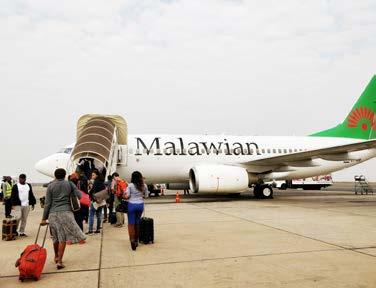
› Effective infrastructure such as airports and air links are essential if Malawi is to create an enabling and sustainable business environment

This is all good on paper, but the practicalities rely heavily on ‘hard’ infrastructure (physical infrastructure such as roads, bridges and railways) and ‘soft’ infrastructure (educational, health, financial, legal and other systems) that are conducive to an enabling and sustainable environment.
Looking at the local scene, we have a robust ‘Malawi Vision 2063’ agenda which aims to transform Malawi into a wealthy and self-reliant industrialised upper-middle-income country by the year 2063. The three pillars of this

vision are: Agricultural Productivity and Commercialisation; Industrialisation; and Urbanisation.
But the question remains: Are we, as a country, ready to take advantage of AfCFTA’s ‘one Africa’ – as well as face the resultant competition – with infrastructure, markets and products that are fit for intra-continental trade?
Certainly, the AfCFTA presents significant opportunities for local enterprises in Malawi to expand their reach, access new markets, and stimulate much-needed economic growth.
There’s the expression that says, “failing to plan is planning to fail”. Malawian businesses need to
appreciate the goals, principles and provisions of the AfCFTA agreement and prepare appropriately to benefit from this. Furthermore, they need to understand the potential challenges that the agreement may present for Malawi and be well prepared to counter them.
The following are some of the steps which I believe can be helpful to the Malawian business community in taking maximum advantage of what AfCFTA offers.
Enterprises need to identify target markets within Africa that align with their products or services. Effective market research will enable them to understand the demand, competition, regulatory environment and consumer preferences in other African markets. There is a large amount of goodquality data on the internet focused on boosting the intra-continental trade agenda. Professional market research companies can also assist with generic
or bespoke research on specific countries, regions or industry sectors.
Ensure that your products or services meet international quality standards and comply with applicable international regulations. This will enable your products to be competitive in both local and regional markets. The facilities of the Malawi Bureau of Standards (MBS) should be fully utilised to ensure there are no technical shortcomings in the drive for industrialisation excellence.
Review and optimise your supply chain to ensure efficiency, reliability, and costeffectiveness. Explore partnerships with suppliers, logistics providers, and distributors within the AfCFTA framework to streamline operations and improve market access.
Understand the trade agreements and protocols associated with the AfCFTA, such as Rules of Origin, Non-Tariff Barriers, and Trade Facilitation. Malawian businesses need to align their practices accordingly to benefit from preferential tariffs and market access.
Collaborate with local and regional businesses to leverage synergies, share resources and expand market reach. Strategic partnerships can help overcome barriers to entry and navigate the complexities of new markets. It is high time that we, as Malawians, create more structured associations to take advantage of economies of scale. For example, in 2022 the African Export-Import Bank (Afreximbank) and Export Development Fund Limited of Malawi co-hosted a workshop in Lilongwe under the theme ‘Leveraging Project Preparation to

Export Development Opportunities in Malawi’.
The Government sector’s support and buy-in is critical to strategic partnerships, as it is key to fostering an enabling and sustainable business environment within Malawi.
Upgrade your infrastructure and invest in technology to enhance productivity, efficiency and competitiveness. This includes improving transportation networks, adopting digital platforms for e-commerce, and implementing effective data management systems.
The June 2024 signing of Malawi’s second Compact under the Millennium Challenge Corporation (MCC) agreement is an example of the kind of infrastructure development that is required to move the country forward. This agreement was signed at the future site of the 53km Chileka - Likuni Road, which will be built under the fiveyear, US$350-million Compact.
The Compact also underscores the strong value of the strategic partnerships mentioned above. When it comes to technology development in the country, academic research institutions such as the Malawi University of Business and Applied Sciences (MUBAS) and Malawi University of Science and Technology (MUST) should be fully utilised. Recently, we have seen various interesting innovations which need patenting to ensure that this techdevelopment culture is encouraged.
Facilitate access to finance for crossborder trade by collaborating with financial institutions and exploring trade finance instruments such as letters of credit, export credit insurance, and factoring.
Access to finance is one of the challenging factors in promoting business in Malawi. Financial institutions

› Good road links to facilitate import-export are vital to landlocked Malawi
need to engage with the business community to see how we can come up with strategies to aid businesses in this regard. Several of these institutions have footholds outside Malawi, meaning they can leverage existing investment networks and expertise.
Know what works in other markets
Even though AfCFTA promotes the ‘one Africa’ ideal, Malawian businesses need to understand other African markets in terms of culture, and must tailor marketing and branding strategies to specific countries on the continent. It is vital to understand cultural nuances, consumer preferences and local marketing channels to
effectively position products or services. Communicating what is seen as a positive message in Malawi can be interpreted as a cultural taboo just across the border.
Stay updated on the latest developments, regulations and opportunities within the AfCFTA. Continuously assess and adapt your business strategies to capitalise on emerging trends and market dynamics.
All those in charge of Malawian businesses must be willing to upgrade their knowledge, attend courses and join AfCFTA-related groups and platforms.
Seek support from relevant trade support institutions, industry associations and government bodies that can provide guidance, market intelligence and assistance in navigating
the AfCFTA framework. The Malawi Investment Trade Centre is pivotal in this regard.
By adopting some of these strategies, Malawian businesses can position themselves effectively within the AfCFTA and seize the opportunities presented by the largest free trade area in the world, both by area and number of countries.
Sean Mwawi Longwe is Head of Marketing, Business Development and Communications at Ritz Attorneys at Law in Blantyre, Malawi. He is tasked with leading and shaping the firm’s growth, digital transformation and client engagement efforts. Sean is also Co-Founder of the Malawi Chapter of the Corporate Social Responsbility Network. A version of this article originally appeared in ‘The Marketer’, the Institute of Marketing in Malawi publication.

Third edition of the awards unveiled in Kampala by the country’s advertising and marketing bodies, in partnership with the Loeries.
Association (UAA) in partnership with the Loeries awards and the Uganda Marketers Society (UMS) recently unveiled the third edition of the Silverback Awards 2024.
These will be held on Saturday, 23rd November 2024 under the theme ‘Innovative Sustainable Marketing: Harnessing Ethics, Impact, and Profitability in the Digital Age’.
This year’s theme underscores the critical role of ethical advertising and marketing practices to not only drive profitability, but also have a positive impact on society and the environment. As the digital landscape continues to evolve, this theme invites participants to explore the balance between innovation, sustainability and ethical responsibility in their strategies.
Speaking at the launch of the awards, Rommel Jasi, Chairman of the Uganda
Advertising Association, highlighted the need for advertisers and marketers to establish self-regulation to protect the industry, and country at large, from global unethical practices.
“As Uganda Advertising Association, we have a code of conduct that our members abide by. But we also believe we should have joint standards – just as the accountants, lawyers and doctors do – to not only protect our industry, but for us to be professional and be able to compete at a global level,” Jasi said.
“This is why partnerships such as the one we have with Loeries and Uganda Marketers Society are important to us, and we are thrilled to host our third edition of the most sought-after industry awards under this timely theme.”
Speaking at the same event, the President of UMS, Charity Winnie
Kamusiime-Asiimwe, urged marketers to upskill through professional programmes to be able to compete favourably and better align with global professional standards.
“As we all know, we’re now operating in a global village, which requires a global outlook for impactful indigenous executions. We need to make ourselves more marketable and this is just the first step to achieving this agenda,” she said.
The Silverback Awards gala, as has become tradition, will be preceded by a one-day Industry Symposium taking place on 22 November 2024. This will provide an invaluable opportunity for professionals to engage in thoughtprovoking discussions and gain insights from industry leaders on how to navigate the evolving landscape of ethical marketing.
Readers of our Digital Edition can find out more about the awards here

Start your journey to becoming a top-notch marketing professional in Uganda and in the region.
Uganda Marketers Society is the premier organisation for marketers in the country, dedicated to promoting excellence in the field.
As a member, you'll gain exclusive access to cutting-edge marketing skill(s) development, ensuring you stay ahead in the ever-changing media and consumption landscape.






To join UMS
At the core of who we are- we learn, grow, and build faster together than by individual effort: Extending a hand to those around us.
We endlessly challenge ourselves to try new ideas, learn new skills, do what we’ve never done, or do what we’ve always done in new ways.
Email: admin@ums.co.ug
Phone: (256)787 433 057



Fads come and go; but the one thing that powers us more than anything is exceptional ideas. Daring to define new frontiers.
A professional edge to whatever we do. Investing our utmost: soul, heart, and skills- sparing no effort to get the best results possible


HAVE YOU EVER wondered how Yuppiechef, the agile and innovative South African kitchen and home store chain, managed its brand equity when it was bought out by the giant Mr Price Group? Or what it was that the Checkers Sixty60 grocery delivery app cracked to gain such market-dominating first-mover momentum in SA? Then there’s the digital marketing strategy behind Discovery Bank and how it has blitzed a pathway to neobank success with its fully digital banking offering.
And not forgetting how Kenya’s Safaricom continues to take its groundbreaking M-Pesa mobile money service to great heights.
These are business case studies in the making and they arrest our attention because they are equally relevant, as they are interesting. Stories capture our curiosity, and stories about African companies like Yuppiechef, Checkers Sixty60, Discovery Bank or Safaricom, that have succeeded (or not) are even more compelling. Why? Because we get to peer behind
With a growing interest in case studies from Africa, understanding the case study formats and knowing how to write one has become crucial. By Claire Barnardo.
the scenes and take a step closer toward the magic formula of what has worked and what can be learnt in the process. Case studies bring business stories to life. They have been around for at least the last hundred years1 throughout a spectrum of fields like marketing, law, business and medicine, and have emerged largely from locations in the Global North.
Yet, with the increased desirability for more cases from the Global South – both for local and global use – case studies are fast becoming a more popular format

› A case study is a deep dive into a real-life context and combines data with rich storytelling capabilities
as a result. But why are cases from our continent so sought after now?
“The majority of cases in the academic world are written about first-world organisations and developedcountry issues. However, African businesses have different environments, challenges, and ways of doing business, which are important to understand and adapt to in order for businesses to be successful in Africa,” says Professor Geoff Bick, Emeritus Professor of Marketing at the University of Cape Town (UCT) Graduate School of Business.
In addition to understanding the unique context of doing business in Africa, there are many growth opportunities here which global companies want to understand in more detail. There is also an increased demand for local teaching cases from African education institutions.
As cases are newer to the continent, the term ‘case study’ tends to still be used quite generically. There are many different types of ‘case studies’ in terms of format and research approach. Firstly, it becomes critical to define and understand exactly which case study format we mean.
“A case study is used frequently to give a synopsis of a particular organisation, industry or event. Also referred to as a ‘caselet’, where the objective is to showcase the organisation, to highlight the context, and what the organisation has done. It tells a story that we can learn from,” says Bick.
In academic research methodology, similarly a ‘case study’ is a particular form of research that focusses on an organisation and which uses typically qualitative data from a number of primary and/or secondary sources to analyse a situation in more detail. For example, looking at the marketing or strategy of an organisation.
While similar to the general case study first mentioned, the latter goes a layer deeper in terms of research and is usually part of an academic submission. But they are similar in format.
Then there are ‘teaching cases’ which are built especially for use in teaching at postgraduate or executive level, but which function to spark debate in learning and are in a completely different format.
“A teaching case also tells a story, but not the whole story. It focusses on a dilemma or failure that an organisation faces. The purpose of the teaching case is to sketch a scenario that will require the analysis of information, and is then used for discussion in a classroom environment,” explains Bick.
“In addition to the development of analytical skills, teaching cases also develop critical thinking skills, decisionmaking skills and communication skills, as delegates are required to make recommendations and motivate their decision,” Bick adds.
With teaching cases, the learning
takes place in the classroom discussion through participation. There is often no right or wrong answer (much to the learner’s dismay) and this is rather different from the lessons drawn out of a case study.
Take the example of what happened to Cape Union Mart, the outdoor and lifestyle retail chain, during March 2020 when the company suddenly found itself face-to-face with a digital marketing nightmare. It was in the middle of a major technology update to cloud services and about to launch five new websites to improve the digital customer experience when the pandemic hit, and lockdown was announced. Then the situation worsened as lockdown unexpectedly caused e-commerce to soar, which resulted in Cape Union Mart facing a crisis in terms of demand.
A case study would deal with the lessons that the company drew from this crisis. Whereas a teaching case would pose the dilemma of the situation and tell the story at the time in order for students to analyse and discuss it in class. Teaching cases are long-form research cases that are carefully curated alongside a teaching note, which is the guideline for the


› Africa has many business case studies in the making
educator on how to teach the case. Now let’s put the focus onto the writing of a case study that showcases a particular incident, organisation, or industry to highlight and draw lessons from it.
A case study is a deep dive into a real-life context of an enquiry and, as such, it combines data with rich storytelling capabilities. Case study methodology is predominantly a qualitative research pathway, but a case will hold both qualitative and some quantitative data. It also has a unique creative capability when compared to other reports. The writing style is more fluid and conversational, while still being professional.
The approach to researching and writing the case study is relatively straightforward and, while similar for an academic-purposed case, it involves a lighter research touch. Data will be collected from primary sources like interviews with the company or industry that the case study is being written about. The case study also incorporates secondary sources found, for example, in articles, industry reports, or internal company reports that have been shared with the writer.
The case writer must be able to facilitate a couple of good interviews, while also being able to synthesise large amounts of information from
secondary sources to then select what is relevant to the case study at hand. In the planning stages of the case, it is useful to consider the following questions before starting: Who is the target audience for the case? What is their knowledge on the subject? What might they not know?
One of the unique features of a case study is that it is an immersion in a real-life example. This makes it more relevant and current in terms of what can be learnt from the case. As such, case studies are most likely to focus on more recent developments from the last five years when being compiled. While older case studies are also important and cases are ageing constantly, there is more of a desire for current case research.
What should case writers aim for when it comes to writing? “Make it interesting and exciting for the reader or delegate in the classroom. Rather than just presenting facts and figures, give quotations from stakeholders that ‘bring it to life’. Add figures, diagrams, exhibits to break the generic writing,” advises Bick.
Case studies tell stories, and this is a creative space to capture what is currently happening in marketing in Africa. Make the case relatable so that your target audience feels drawn in to read it and learn from the story. This also results in it being shared further afield.
It is useful to stick to the case study format of sub-headings. Set a timeline around the case to give a natural boundary to what is being written. But, within that space, the writer also has this rare capacity to really make the case their own in terms of its narrative.
Good writing basics are essential. Aim for concise, clear sentences; accurate referencing; useful numbers that add value; and bring in a voice or two to represent different viewpoints on the topic.
Direct quotations and insights on the subject will add colour to the case study and keep your reader engaged. Remember that case studies are about experiential learning and piecing together the current landscape.
In the bigger picture this is a framework for marketing professionals to capture African business best practice. This is not only vital to do, but also a major development in how professionals are crafting marketing history, while also celebrating and learning from the many stories across the continent. Case studies ultimately add to the body of knowledge and should be embraced – especially for that role in the Global South.
Claire Barnardo started and manages the UCT GSB Case Writing Centre. It boasts a collection of 80 published traditional teaching cases and five multimedia Doing Business in Africa cases. Claire is passionate about writing and championing African and emerging market business cases. She has international casewriting qualifications alongside an MA degree (UCT). Claire is assisting the African Marketing Confederation with its Chartered Marketer Africa CM(A) programme.
https://www.hbs.edu/case-method-100
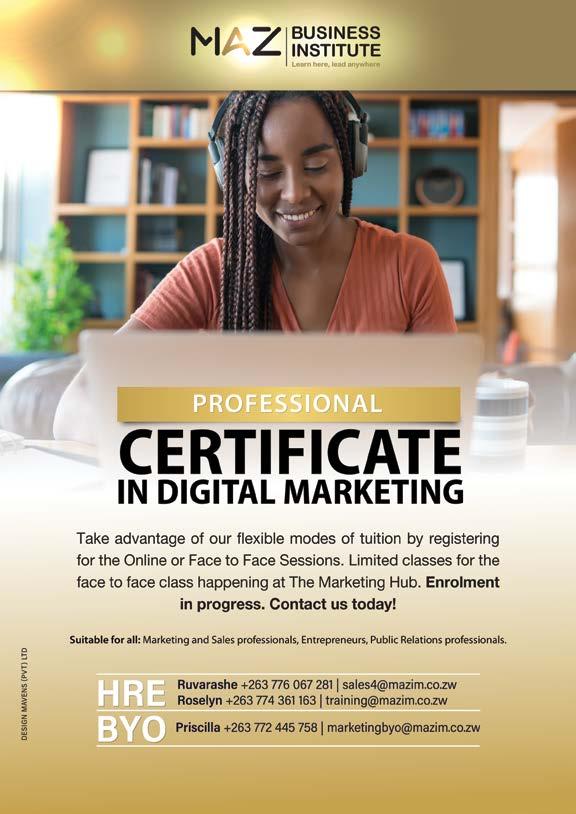

Association of Zimbabwe (MAZ) delivered an unforgettable experience recently, when it hosted the inaugural Interbrands Sports Games at the Belgravia Sports Club in Harare.
This event brought together over 40 brands from diverse industries for a day of intense competition and fun-filled networking that celebrated both athletic prowess and brand synergy.
The primary objectives were to foster a spirit of camaraderie among industry professionals, promote physical fitness, and create a platform for brands to engage and collaborate in an informal setting.
With a diverse array of activities that thrilled participants and entertained spectators, the day proved to be a true showcase of competitive spirit.
Impala Car Rental clinched victory in football, while Nyaradzo Group
Day of fun fostered camaraderie among industry professionals, promoted fitness, and created a platform for brands to engage.

dominated the netball courts. Cimas excelled in volleyball, and FBC Bank shone brightly on the basketball court. In a notable double win, Pacific Cigarette Company triumphed in both tennis and pool, while Proton proved their mettle in the five-a-side football
› A thrilling football match underway at the MAZ Interbrands Sports Games
› Numerous brands showcased their products and services
tournament. The tug-of-war saw Barloworld emerging as champions.
Adding to the excitement, the games featured a series of traditional contests that highlighted the rich cultural heritage of Zimbabwe. Visible Brands took the top spot in Draft, Varichem excelled in Maflau, and College Press won Rakaraka. The youngest player of the tournament, Lincoln Mutetwa, was celebrated for his remarkable performance in the Grassroots category.
“The Interbrands Sports Games have surpassed our expectations, bringing together the marketing community in a unique and engaging way. The enthusiasm and sportsmanship displayed today are a testament to the vibrant spirit of our industry. We look forward to building on this success and making the next event even bigger and better,” said Gillian Rusike, MAZ Executive Secretary.


› Participants competed for a variety of trophies



Andrew Camp discusses the marketing strategies driving the recovery of the postpandemic South African inbound travel market.

›

is
international inbound travel market, like many other global tourism sectors, faced unprecedented challenges due to the Covid-19 pandemic. Now, as the world emerges from the pandemic-induced chaos, the inbound industry is showing promising signs of recovery.
In this article, I delve into the marketing strategies that are driving the rebound, the challenges faced and overcome, and the outlook for the sector.
If your business is not adapting to the current needs of its buyers and offering a more flexible approach to attract prospective customers, you will be left behind. There are many disruptors entering the market, so it is imperative that your policies, procedures and terms of business are aligned with your marketing strategies. A business that is confined by red tape is destined for failure.
One of the most significant shifts in
marketing strategies post-pandemic has been the emphasis on digital transformation. The pandemic accelerated the adoption of digital tools and platforms, and South African tourism marketers have leveraged this trend to revitalise the inbound travel market.
Among the key levers:
● Social media campaigns: Platforms such as YouTube, Instagram, Facebook, and X (formerly Twitter) have become vital in engaging with potential travellers. For instance, South African Tourism launched a #It’sPossible campaign, showcasing the country’s diverse attractions and encouraging potential tourists to visualise their future visits.
According to a 2023 report by Statista, 74% of travellers are influenced by social media in their travel decisions, underscoring the importance of robust digital marketing efforts.
● App adoption and enhancement: With a young population, increased smartphone adoption and improved Internet penetration, Africa has become one of the world’s major emerging markets.
Reports from DataSparkle, a data and analytics platform for emerging
markets, shows that Africa had over 270-million monthly active app users at the end of 2022 (a 14% rise in a year) who spent four hours a day on mobile apps. Therefore, it is crucial that businesses have app development and enhancement within their marketing strategy.
● Virtual reality experiences: Initially developed to compensate for Covidinduced travel restrictions, South African tourism organisations have successfully invested in virtual reality experiences. Virtual tours of popular destinations such as Cape Town’s Table Mountain and the Kruger National Park continue to provide potential tourists with immersive previews of what they can expect.
Understanding the changing demographics and preferences of travellers has led to more targeted marketing campaigns. South Africa has focused on several key markets:
● Reconnecting with traditional markets: Historically, the country’s key international markets included the United Kingdom, Germany and the United States. South African Tourism has renewed efforts to reach these markets with tailored messages

› Tourism organisations have successfully invested in virtual reality experiences
emphasising safety, adventure and unique local experiences.
● Emerging markets: The pandemic has shifted SA’s marketing focus towards emerging markets such as India and China. Research by the World Travel & Tourism Council (WTTC) shows that these markets are expected to grow significantly in the coming years.
South Africa has launched campaigns in these regions highlighting the country’s rich cultural heritage, diverse wildlife, world-class food and wine options, and luxury experiences.
● GenZ and Millennial audiences: It is extremely important that the younger generations (under the age of 35) are included in tourism marketing strategies, since they are the current influencers and future decision makers.
These ‘prosumers’ (an individual who both consumes and produces) are more engaged in the manufacturing process of the product. They want to understand that your business is ethical, green and sustainable for future generations to enjoy. It is crucially important to be authentic, transparent and informative in all communications with these younger generations, who will assess your company values and either align with you or sever ties for life.
With health and safety being top concerns for travellers, South Africa’s tourism sector has placed significant emphasis on communicating its commitment to these areas. The implementation of the ‘Safe Travels’ stamp from the World Travel & Tourism Council (WTTC) has been crucial in reassuring travellers.
This certification indicates that health protocols are being followed to ensure a safe environment. Moreover, South African Tourism has actively
communicated updated health and safety measures through various channels, including the SAT website and email newsletters. This transparency has been vital in building traveller confidence.
Following the country’s national elections in June 2024, a coalition government was formed. There is now greater ministerial collaboration between the Department of Tourism and Department of Home Affairs, which has led to many positive outcomes for tourism industry stakeholders.
This will lead to blockages being removed to allow more tourists to enter the country, which promotes job creation and, ultimately, a greater contribution to national GDP.
The pandemic created various negative perceptions around travel safety. South Africa faced additional challenges related to perceptions of high levels of crime. To counteract these concerns, targeted marketing campaigns were necessary.
Among them:
● Local partnerships: Collaborating with local businesses and influencers has helped to reshape perceptions. By showcasing local experiences and testimonials, the narrative around safety and hospitality has been positively influenced.
For example, partnerships with well-known South African personalities like comedian and talk-show host, Trevor Noah, and important influencers
have helped to create a more favourable image of the country.
● Emphasising safety protocols: Clear communication about health and safety measures, including sanitisation practices and vaccination requirements, has been critical. The South African Tourism Board has effectively used infographics and videos to illustrate the steps being taken to ensure safety.
The financial impact of the pandemic on the travel and tourism industry has been severe. Many businesses faced closures and a significant reduction in revenue. Marketing strategies needed to adapt to these financial constraints.
Among them:
● Cost-effective digital advertising: With reduced budgets, there has been a shift towards more cost-effective digital advertising methods. Pay-perclick advertising and targeted social media ads offer more control over spending and can deliver high returns on investment.
● Government support and incentives: The South African government has introduced various support measures for the tourism sector, including grants and subsidies. Marketing efforts have been aligned with these initiatives to maximise their impact. For instance, promoting government-funded discounts and packages has encouraged travellers to visit the country.
The pandemic has led to shifts in travel behaviour, including a rise in demand for off-the-beaten-path destinations and experiential travel. South African tourism marketing has had to adapt to these changing preferences.
Among them:
● Promoting diverse experiences: To
cater to the evolving interests of travellers, marketing strategies have emphasised South Africa’s diverse offerings beyond the well-trodden tourist paths.
Campaigns highlighting eco-tourism, community-based tourism, and unique local experiences have attracted travellers seeking more personalised and meaningful holidays.
Inbound leisure and business travellers from India and China still face lengthy waits for their visa applications to be approved. Convoluted and antiquated processes have fallen behind other destinations.
Thanks to the collaboration of the coalition government departments partnering with industry stakeholders, SA’s visa processes are being enhanced to radically remove obstacles and reduce approval times for travellers.
In early September, the Department of Home Affairs announced the ‘Trusted Tour Operator Scheme’ (TTOS), a pivotal initiative set to reform the visa application process, making it faster and more efficient for tour operators and travellers from these key markets.
The outlook for South Africa’s inbound travel market is optimistic, though there are several factors that will shape its trajectory.
Among them:
According to the World Tourism Organization (UNWTO), international tourist arrivals to the African continent are expected to increase by 4-6% annually over the next five years. South Africa, with its diverse attractions and favourable climate, is well positioned to benefit from this growth.

Sustainability is becoming a key focus in the travel industry. South Africa is making strides in promoting sustainable tourism practices, which will likely enhance its appeal to eco-conscious travellers. Initiatives such as the Green Tourism Incentive Programme aim to support businesses in adopting sustainable practices.
Continued investment in technology, including AI-driven marketing tools and enhanced VR experiences, will play a crucial role in shaping the future of South Africa’s tourism sector. These advancements will help to deliver more personalised and engaging travel experiences.
Strengthening partnerships with international travel agencies and influencers will be crucial in expanding South Africa’s reach in key markets. Building robust relationships and collaborative marketing efforts can drive increased visitor numbers and enhance the country’s global tourism profile.
The rebound of the South African international inbound travel market post-pandemic is driven by a
Sector has shown great adaptability ›
combination of digital transformation, targeted marketing strategies, and a focus on health and safety. Despite facing challenges such as negative perceptions, financial constraints and shifting travel trends, the sector has demonstrated resilience and adaptability.
Looking ahead, the focus on sustainability, technological advancements and global partnerships will be key to sustaining growth and ensuring South Africa remains a top destination for international travellers.
Readers of our Digital Edition can watch an SA Tourism video commercial shot with Nigerian visual artist and photojournalist, Yagazie Emezi, here.
Andrew Camp is Head of International Sales & Marketing for the Sun International Group, a position he has held since 2018. He has three decades of sales, marketing and business development experience, including 13 years’ experience in the tourism and hospitality sector. Andrew is an avid sportsman and has three Comrades Marathon bronze medals.

The humble business card is surely one of the oldest, simplest and most cost-effective marketing tools we have. Is it still relevant? Innocent Mushamba thinks so.
IN TODAY’S MOBILE-FIRST world, where digital networking platforms like LinkedIn have gained immense popularity, the relevance of traditional business cards has, understandably, been questioned. Tech enthusiasts argue that business cards are outdated and that NFC (nearfield communication) technology or QR codes should be used instead.
With global stats agreeing that around 88% of all business cards are thrown away within the first week after being given out, and with 63% of those cards not even being used, according to a 2022 survey by the financial education website Credit Donkey, are traditional business cards still viable?
In-person meetings are far less common
Certainly, the Covid-19 pandemic massively impacted business card print production – simply because people were seldom meeting face to face and opting for online meetings and communication. To a certain degree, it’s a trend that continues.
In a 2021 BBC interview, Florian Baumgartner, International President of business card printing company Vistaprint, said sales during 2020 had dipped by 70% as lockdowns took hold.
But now that companies are calling people back into the office, are we seeing that business cards have lost their relevance permanently? Or do they still have an important place in the business world? One way to answer that is by asking the question, “Have business card sales improved – and if so, why?”
Research tells us that the business card market is expected to reach US$242.3-million in value by 2027, growing at a healthy compound annual growth rate (CAGR) of 11.2% between 2021 and 2027. This is according to a study by the research firm Market Research Future. Not bad figures for a supposedly ‘dying’ industry.
I know that right now there’s someone reading this, thinking “it’s because the older generation in leadership just can’t move with the times”. Hold onto that thought for a second!
Did you know that 2023 research by Tapni, a platform which helps you

› Plantable business cards are made from biodegradable paper waste and may have plant seeds embedded in them
create digital business cards, revealed that 34% of e-commerce businesses now accept printed business cards that come as part of the package for dispatched orders? So, even datadriven businesses know the power of personalisation from printed business cards! That personal touch makes brands more memorable.
The reason we see a rise in business card sales is simply because they work! The average website has a conversion rate of 2.35% (Shopify) while the business card’s average is 12 %, according to the same 2023 research. Does that mean digital marketing doesn’t give results? Of course not.
The principle is this: people do business with people they like. Personal interactions tend to be more meaningful because they are face to face. The act of physically handing over a card and engaging in a conversation can leave a lasting impression and build trust and rapport.
According to Credit Donkey’s Global Business survey, “it’s a breach of etiquette to not have business cards. People expect them … attempting to network without them is a big mistake.” Business etiquette alone is reason enough to always have business cards. Not having one makes you look disorganised and unprepared.
On the flipside, a memorable business card makes you referable. It brings your brand to life, is a convenient means for people to get your contact details quickly, and creates a credible professional image. A good business card can be a great tool for B2B referrals.
To reference a blog series on Japanese business etiquette which was published on Oishya.com, a Japanese business website, anyone who is in business must always carry at least 100 business cards per week for business trips, on average handing out three or four cards at a small meeting, 10-12 cards at a larger meeting, and over 100 for a trade show.
Now that we know business cards remain a vital business tool, how can we make sure that we create value and stay relevant when we reach into our pockets to hand them out? Here’s what we should really ask: ‘What’s the value you’re willing to put on your brand’?
The world’s most expensive business cards are the Black Astrum Signature Cards, which cost US$1,500 each and are sold in packs of 25, 50 or 100 –meaning the least you may spend to get them is $37,500 for 25. A pack of 100 will cost you $150,000. That is how much value some people are willing to invest in their personal brand!
The number-one mistake when making business cards is using cheap-looking paper. According to a blog post by UKbased Discover Print, 39% of people will not do business with people who have cheap-looking business cards. In many cases, it may be better not to have a business card than to have a bad one.
Aura Print, another UK printing company that operates in various countries, reports that about 86% of customers around the world say thicker business cards look more professional. Thinner card material does not nearly portray the same professional acumen that thicker card paper does.
Sidenote: If you’re a food lover, you may want to order a pack of
edible business cards filled with luscious Belgian white chocolate, or even cards made from cookies. And for the environmentally conscious businessperson, there are eco-friendly plantable business cards made from recycled and biodegradable paper waste. Some even have plant seeds embedded in them.
So, business cards can be fun too! Okay, now let’s get back to our more serious discussion.
Simplicity is the golden rule of a good business card. No one wants to strain their eyes with an overcrowded, busy and cluttered card. The right balance of space is key. Colour is more memorable and stands out better than plain white. This is why a company must invest in a brand manual and mood board.
Aesthetics are great, but the card must also be functional. If there is a QR code, ensure that it works, as sometimes a company’s website or landing page may change – and this affects your QR code. Then it’s not the printer’s fault. It’s neglect on the part of the marketing team. If there are spelling and other errors, that also falls within the marketing department’s responsibilities.
In conclusion, despite the new world

› Innocent Mushamba believes business cards can effectively complement social media and digital strategies
hold relevance in 2024. They provide a tangible and personal way to make a lasting impression, showcase branding, and establish professional connections. By embracing current trends in design, materials and digital integration, business cards can effectively complement digital strategies and contribute to successful networking and business growth.
Innocent Mushamba is an experienced media, marketing and communications professional based in Harare, Zimbabwe. He is Marketing Manager at No Walls Media, a full-service media company that builds branding, advertising and digital solutions. He is also a part-time Lecturer and Training Facilitator with the Marketers Association of Zimbabwe.
Jane Menzies, Senior Lecturer in International Business at the University of the Sunshine Coast in Australia, says her own informal survey of 61 contacts on LinkedIn found that more than half used both business cards and LinkedIn for introductions, and another 11% said they used cards only. Only a little over a third eschewed cards altogether. Writing in The Conversation, she notes that a well-designed business card can convey a personal brand. And the mere act of handing over a
card can build a bridge, ensuring that a meeting remains memorable.
“At times when time is of the essence, such as in an elevator pitch, cards can offer a swift and efficient medium for exchanging quite a lot of information. And they are likely to hang around, reminding the recipient of the meeting, all the more so the rarer they become.
“They are not for everyone, but for quite a while yet they are likely to be for people seriously trying to reach out,” she says.

Tewodros Eyob Fisseha examines how the marketing industry can support the growth and development of the new Ethiopian Capital Market.
AS MANY PEOPLE WILL be aware, the Ethiopian Capital Market is due to commence operations soon. This significant milestone will have profound implications for businesses, changing how they operate and engage with stakeholders inside and outside the country.
One of the primary changes brought about by the impending launch of the new Ethiopian Securities Exchange (ESX) will be the heightened focus that management teams and boards must place on creating shareholder value.
The objective of maximising shareholder value is not new, but a formal capital market will accelerate this shift. As businesses seek financing through the capital market, the number of investors and shareholders involved will increase, creating broader accountability beyond boardrooms.
As I see it, this has two implications for business operations and organisational management (although there may be more).
The first is the increased accountability to shareholders. The
wider the shareholder base that the organisation is accountable to, the greater the need to be transparent in decision-making and daily business operations. This shifts how organisational information, data, strategies and financial performance are documented and reported.
The second implication – and the most important one for us in Ethiopia, I believe – will be the emphasis that management teams and boards must place on shareholder value. Not only will the number of shareholders within
› A Capital Market Roadshow in the regional city of Hawassa delivers presentations to local business owners, shedding light on the nature of capital markets and the broader benefits it could bring to businesses in the region
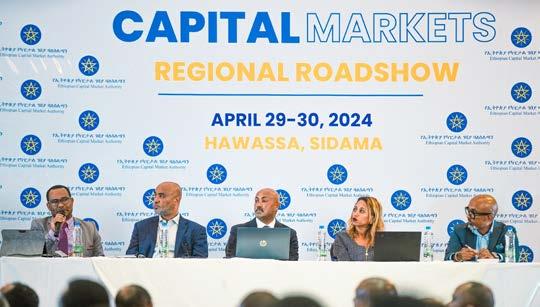
a company increase, but also the degree of accountability required.
Let’s examine how marketing can create shareholder value for a business listed on the new Ethiopian Securities Exchange or, indeed, any other stock exchange.
To understand how, we must first clarify the concept of value-based marketing. Popularised by the late British marketing academic, Peter Doyle, it is not to be confused with values-based marketing (which appeals to a customer’s ethical or personal values). Value-based marketing is about demonstrating the financial impact of marketing on a company’s bottom line. It is essential in capital markets where shareholders expect the best possible returns.
Marketing contributes to shareholder value when creating assets that generate future cash flows with a positive net present value (the difference between the present value of cash inflows and the present value of cash outflows over a period of time).
Historically, company value was a victim of accounting measures that overlooked intangible marketing assets such as brand recognition and customer loyalty. Shareholder value analysis helps bridge this gap by focusing on the company’s ability to generate future cash flow – which is where marketing assets become pivotal.
Marketing assets are:
1. Marketing knowledge. Superior marketing knowledge provides core competencies consisting of skills, systems and information that convey a competitive advantage to the firm in identifying market opportunities and developing marketing strategies.
2. Brands. Successful brand names convey images to customers that make them more desirable than competitive products. Owners of powerful brands possess assets that attract customers, often earn premium prices, and can be enduring cash generators.
3. Customer loyalty. A company that has a loyal customer base will be more profitable and should grow faster than other companies. Many studies have shown that loyal customers buy
more of the company’s products, are cheaper to serve, are less sensitive to price, and bring in new customers.
4. Strategic relationships. A company’s network of relationships with channel partners can provide incremental sales and access to new markets and allow it to leverage its competencies in additional areas (mostly relevant in B2B marketing).
These marketing assets do not typically appear on the balance sheet, but are critical drivers of shareholder value.
Traditional accounting undervalues these assets because their impact on future cash flows is difficult to measure directly. However, through shareholder value analysis, companies can evaluate the financial worth of these intangible assets, which are often more reflective of a company’s true value.
As mentioned earlier, shareholder value depends on four factors: The level of future cash flow, the timing of cash flow, the risk attached to the business, and its
continuing or net present value. Marketing assets drive all these four determinants of value. Let’s look at each in more detail:
● Effects on the level of future cash flow. Faster sales growth drives up returns to shareholders as long as the additional sales deliver economic profit. While cost-cutting and downsizing can temporarily boost cash flows, only sales growth can bring long-term growth in cash flows. Marketing drives sales by understanding customer needs, developing targeted campaigns, and building brand preferences. Strong brands can command premium prices for products or services. Effective marketing also helps reduce costs by streamlining operations and building customer loyalty (less price sensitivity). Both factors contribute to higher profit margins, resulting in more cash flow.
● Effects on accelerating cash flow. A birr (the primary unit of currency in Ethiopia) today is worth more than a birr tomorrow (or, if you prefer, a dollar today is worth more than a dollar tomorrow). Shareholder value increases if cash flow generation is quicker. Marketing activities like pre-launch campaigns and influencer marketing can accelerate customer awareness and adoption of new products.
● Effect on business risk. The third factor determining the value of the business is the opportunity cost of the capital used to discount future cash flows. This discount rate depends upon market interest rates. Plus, the risks are attached to the specific business unit. The risk attached to a business is by the volatility and vulnerability of its cash flows compared to the market average. Strong brands, customer loyalty and strategic partnerships create a competitive advantage, making a company less susceptible to market fluctuations and competitor actions. It reduces the perceived risk of the investment for shareholders, leading to a higher valuation.
● Effect on continuing value. Because a company ideally operates for many years, the continuing value often makes up a large portion of the overall shareholder value compared to the cash flow during the initial planning period in shareholder value analysis. Marketing assets like brand loyalty, customer knowledge and innovation capabilities create a sustainable edge over competitors. It allows the company to keep generating profits for a long time. A company with a strong brand loyalty programme might have a loyal customer base that continues to purchase even if a competitor temporarily offers a lower price.
In conclusion, marketing is integral to creating shareholder value, especially in a growing and evolving capital market like Ethiopia’s. By utilising shareholder value
analysis to demonstrate the financial impact of marketing, companies can effectively communicate their value to top management, investors, and other stakeholders in the capital markets. As Ethiopia’s capital market develops, businesses that understand and leverage the link between marketing and shareholder value will be well-positioned to thrive.
Tewodros Eyob Fisseha is a 24-yearold entrepreneur and marketing practitioner based in Addis Ababa, Ethiopia. He began his career in marketing by starting a social media and digital marketing agency in his home country in 2020. Noticing the gaps in the industry, he established the first panel discussion and networking platform for marketers in Ethiopia to serve as an educational platform and a bridge between beginners, enthusiastic youths, and practicing professionals.
After more than two years laying the groundwork for an effective capital markets system, Ethiopia is now on the brink of launching its first fully fledged stock market.
The Ethiopian Capital Market Authority has achieved significant milestones in 2024. In February, the Authority announced it had begun accepting applications for licenses from prospective participants in the capital market, issuing the First Individual Securities Investment Advisor License on June 26th
Then, on August 29th, it launched the Ethiopian Capital Market Regulatory Sandbox, which allows financial technologies and other capital market service providers to test new technologies and products before full market entry.
While the exact date for the commencement of market operations hasn’t been announced, the licensing process has begun, a
regulatory framework is in place, and the Ethiopian Securities Exchange, the primary platform for securities trading within the broader capital market framework, will inaugurate in November 2024.
According to African Business magazine, the ESX does face a challenge in persuading foreign investors to set aside local macroeconomic and security concerns.
Government representatives and finance executives from Ethiopia have been hosting investor roadshows across the continent and beyond. Their aim is to highlight ESX and the chance to tap into the country’s burgeoning private sector.
The African Development Bank (AfDB), says Ethiopia’s economic growth is projected to be 6.7% during 2024–25. The economy grew 7.1% in 2022/23, up from 6.4% in 2021/22.
Ethiopia had an elementary stock market in the 1960s and early ‘70s.
The answer is ‘yes’ and ‘no’ because there are significant regional variations in media consumption habits.
By Mike Simpson
.

› In certain African markets, traditional TV remains popular with Gen Z
IN JULY 2024 , THERE WAS
a stir in Britain’s media and marketing industry when the number of 16 to 24-year-olds watching traditional TV – defined as live and catch-up programming on a television set at home – dropped to less than 50% for the first time.
Just a few years prior, in 2018, the figure was 76% of 16 to 24-year-olds watching traditional TV on a weekly basis. The figures are supplied by Ofcom’s, the regulator and competition authority for the UK communications industries, as part of its annual Media Nations report.
Video platforms are far more appealing
“It will come as no surprise to many that the age group spent three times as long each day (1hr 33min) watching video-sharing platforms such as TikTok and YouTube,” commented the BBC in a news report on 31 July this year that analysed the Ofcom figures.
“Children between the ages of four and 15 are also switching off, with only 55% watching traditional TV each week last year, compared to 81% in 2018.”
It’s a similar trend in the US and in many other international markets. Gen Zedders are moving away from traditional TV at a significant rate.
What’s the situation in Africa, where Gen Z comprises 31% of the population according to one estimate (Association of Kenya Insurers)?
In South Africa, there’s a notable shift away from traditional TV to streaming, according to figures from the Broadcast Research Council of SA, which show almost a third of TV viewing now happens online. Leading this charge is Gen Z, which comprises 42% of streaming TV viewers in SA.
“This evolution away from traditional TV makes sense,” says Leslie Adams,
Sales Director at streaming specialists Reach Africa. “When you consider that, more so than any previous generation, Gen Z’s life is lived on demand. If they want something to eat, they can order a takeaway via Uber Eats with a simple tap.”
Adams says growing up with ‘life on demand’ has steered Gen Z firmly away from the ‘appointment’ viewing offered by linear TV.
“Gone are the times when the household would plan the day around watching a show that airs at a certain time – Gen Z has never really known this reality, having grown up in a world powered by the internet,” he states.
In other parts of Africa, the question ‘are Gen Zedders turning off their TVs?’ is met with varying responses.
According to Sandra Otieno, Kenyanbased Insights Analyst with market research company Kasi Insight, there are significant regional variations in media consumption habits.
“In Southern Africa, there is a definitive pivot towards digital media, marking a clear departure from traditional formats,” she explains. “Conversely, East Africa displays a stronger affinity for traditional television, with continued high viewership rates.
A mixed landscape in certain regions
“Central and West Africa show a mixed media landscape, where traditional and digital media coexist without a dominant preference. Meanwhile, North Africa is experiencing a steady, though gradual, transition towards digital alternatives.”
Based on Kasi Insight’s Media Consumption Tracker for the months of April, May and June 2024, Otieno provides the following breakdown of regional trends:
● East Africa: In this region, television continues to maintain a strong
presence among Gen Z. Uganda, with an average viewership of 42%, showcases the highest engagement. Kenya and Tanzania also hold steady, with 25% and 21% of Gen Z still regularly watching TV. These figures indicate that in East Africa, traditional television remains a significant part of media consumption.
● Southern Africa: Here, the narrative changes dramatically. South Africa and Botswana exhibit stark declines in TV viewership, with averages of only 3% and 2%, respectively. This clear shift suggests that Southern Africa’s Gen Z is decisively turning away from traditional TV, favouring digital platforms.
● Central and West Africa: The trends in these regions are inconsistent, showing no clear movement towards or away from television. For instance, Nigeria and the Democratic Republic of the Congo report moderate engagement levels of around 15%, indicating that traditional TV still holds relevance among Gen Z here.
● North Africa: A gradual decrease in traditional TV viewership characterises this region. Algeria and Egypt are seeing a slow yet steady migration from TV, with viewership not exceeding 10%, hinting at a growing preference for digital media, although not as rapidly as in Southern Africa.
Comments Otieno: “This diverse pattern underscores the need for media companies, advertisers, and content creators to adopt flexible and localised strategies. Effectively engaging with Gen Z in Africa requires a deep understanding of these varied consumption habits, which straddle both traditional and modern media landscapes.
“As the preferences of Gen Z continue to evolve, a strategic blend of old and new media approaches will be essential for capturing and retaining their attention.”
› Une rue de Kaolack, au Sénégal. OmniRetail est au service des petits commerçants de quartier
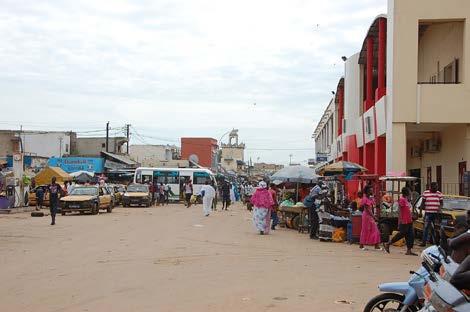
La plateforme de commerce électronique B2B soutient que la Côte d’Ivoire, le Cameroun et le Sénégal présentent des opportunités de croissance plus favorables et moins volatiles.
LA PLATEFORME
nigériane de commerce électronique B2B OmniRetail a commencé à développer sa stratégie sur les marchés francophones d’Afrique subsaharienne en recrutant Steve Dakayi comme responsable national pour la Côte d’Ivoire.
La Côte d’Ivoire est le premier pays africain francophone visé par l’entreprise. Les autres pays de sa stratégie d’expansion francophone sont le Cameroun et le Sénégal.
OmniRetail offre une solution intégrée B2B qui connecte les
fabricants, les détaillants et les distributeurs avec les entrepôts et les compétences logistiques. En d’autres termes, elle digitalise les chaînes d’approvisionnement des biens de consommation à rotation constante. Son rôle consiste à aider les petits commerçants du quartier à obtenir des prêts auprès d’institutions financières.
«Dakayi rejoint OmniRetail après la fermeture de BetaStore, une start-up de commerce électronique B2B qu’il avait fondée en 2020. Selon TechCabal, la publication technologique africaine, l’ancien fondateur de BetaStore a
travaillé dans le commerce électronique pendant une décennie et a été directeur commercial et de l’exécution pour Jumia. L’article cite Amber Yadav, responsable de la division commerce de détail d’OmniRetail : « La philosophie de l’entreprise est de chercher à s’étendre une fois qu’elle s’est bien implantée. « Nous réfléchissons à de nouvelles régions géographiques qui sont plus pertinentes en Afrique francophone, telles que le Cameroun, le Sénégal et la Côte d’Ivoire. C’est pourquoi nous nous développons. C’est la raison de notre expansion.
CROISSANCE SIGNIFICATIVE DE LA CLASSE MOYENNE
Dakayi a déclaré à TechCabal : «L’Afrique francophone est très sous-estimée. «
Nous avons constaté une croissance importante de la classe moyenne parmi les dernières tendances que nous avons observées. Cela s’est traduit par une hausse du pouvoir d’achat et par de nouvelles habitudes de consommation. Ce sont des éléments essentiels pour la croissance.
Selon Trendtype, une société de conseil spécialisée dans les marchés émergents, les marchés francophones se sont avérés plus résistants aux hausses inflationnistes au cours des deux dernières années en raison de l’arrimage de la monnaie à l’euro. Par conséquent, les dépenses de consommation sont moins sous pression que sur des marchés tels
que le Nigeria et le Ghana.
Selon le Fonds monétaire international (FMI), six des sept économies d’Afrique subsaharienne qui connaîtront la croissance la plus rapide en 2024 sont des pays francophones. Parmi eux figurent le Niger, le Sénégal, la Côte d’Ivoire et Djibouti.
Orphée Monnet Kébé, président fondateur et directeur général de Gabriel Wealth Management à Abidjan, en Côte d’Ivoire, estime que les progrès des économies africaines francophones ont été «fulgurants» ces dernières années, créant un terrain fertile pour l’émergence d’une nouvelle élite économique.
Dans le «Africa Wealth Report 2024» publié par Henley & Partners, une société internationale spécialisée dans la résidence et la citoyenneté par l’investissement, elle note que «des entrepreneurs visionnaires
ont saisi les opportunités offertes par cet environnement changeant pour créer des entreprises prospères et contribuer à la création de richesses dans leurs communautés».
L’incursion d’OmniRetail en Afrique subsaharienne francophone bénéficiera également de la sortie de Wasoko, la plateforme de commerce électronique B2B basée au Kenya, qui a quitté le Sénégal et la Côte d’Ivoire en 2023. L’autre grand acteur de la région est Chari, fondé en 2020 par deux Marocains et qui cible un public francophone.
Selon Trendtype : «OmniRetail est sans aucun doute la société la plus performante dans le domaine du commerce alimentaire en ligne en dehors de l’Afrique du Sud et a été reconnue comme l’entreprise à la croissance la plus rapide en Afrique.

B2B e-commerce platform believes the likes of Côte d’Ivoire, Cameroon and Senegal offer better and less volatile growth prospects.
› A street in Kaolack, Senegal. OmniRetail serves small neighbourhood retailers
Nigerian-based B2B e-commerce platform, has signalled its strategic move into the markets of Francophone sub-Saharan Africa by appointing Steve Dakayi as its Country Lead for Côte d’Ivoire.
Cote d’Ivoire is the first Frenchspeaking African nation it is targeting. Others in its Francophone expansion strategy include Cameroon and Senegal.
OmniRetail is an integrated B2B platform connecting manufacturers, retailers and distributors with warehouses and logistics knowhow. Essentially, it digitises the supply chains of fast-moving consumer goods. It serves small neighbourhood retailers and also helps them to obtain loans from financial institutions.
“Dakayi joins OmniRetail after shutting down BetaStore, a B2B e-commerce startup he founded in 2020. The former BetaStore founder has worked in e-commerce for a decade and was commercial and fulfilment lead for Jumia,” reports TechCabal, the African technology publication.
It quotes Amber Yadav, OmniRetail Head, Retail Division as saying: “As a company and philosophy, once you have gotten your foot in properly, you start looking into expansions. We are

looking at new geographies that make more sense in Francophone Africa like Cameroon, Senegal, Cote d Ivoire. That is the reason for our expansion.”
Dakayi told TechCabal: “Francophone Africa is very underestimated. “Some of the latest trends we have observed is significant growth in the middle class. This has led to increased purchasing power and new habits in terms of consumption. These are key growth drivers.”
According to Trendtype, an emerging markets consultancy, Francophone markets have proven to be more resilient to inflationary rises during the past two years because of the currency peg to the Euro. Consequently, consumer spend is under less pressure than in markets such as Nigeria and Ghana.
The International Monetary Fund (IMF) says six out of the seven fastestgrowing economies in sub-Saharan Africa in 2024 are Francophone countries. Among them are Niger,
Senegal, Côte d’Ivoire and Djibouti. Orphée Monnet Kébé, Founding President and Managing Director of Gabriel Wealth Management in Abidjan, Côte d’Ivoire believes the progress of French-speaking African economies has been “dazzling” in recent years, creating fertile ground for the emergence of a new economic elite.
Writing in the ‘Africa Wealth Report 2024’ published by Henley & Partners, a global company specialising in residence and citizenship by investment, she notes that “visionary entrepreneurs have seized the opportunities offered by this changing environment to build successful businesses and contribute to wealth creation in their communities.”
OmniRetail’s foray into Frenchspeaking sub-Saharan Africa will also benefit from the exit of Wasoko, the Kenyan-based B2B e-commerce platform, which left Senegal and Cote d’Ivoire in 2023. The other big player in the region is Chari, which was founded in 2020 by two Moroccans and targets a Francophone audience.
Says Trendtype: “OmniRetail is arguably the star performer in online food retail outside South Africa and has garnered recognition as the fastestgrowing company in Africa.”




With Our Six-Week Online Short Course



• Deliver more personalised, relevant marketing experiences
• Leverage AI to predict consumer behaviour and market trends
• Automate repetitive tasks, saving time and cutting costs
• Create high-quality AI content
• Integrate agile analytics to respond quickly to market shifts


